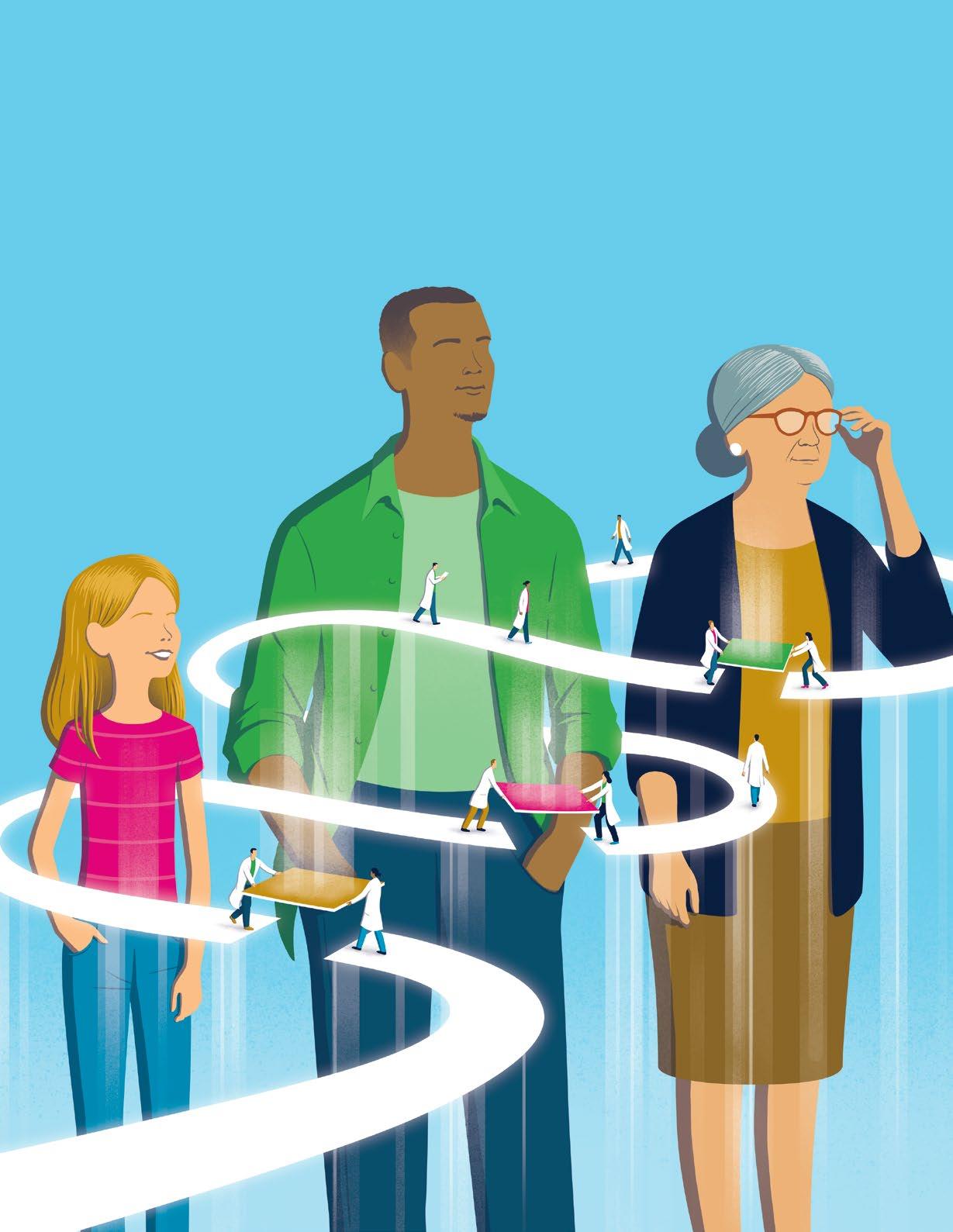

MEDICINE
CARING ACROSS GENERATIONS
THE MAGAZINE OF THE HERBERT WERTHEIM COLLEGE OF MEDICINE
CONTENT
FEATURE
06
FIU Medicine redefines health care for all ages with groundbreaking alliances.
RESEARCH
18
20
23
FIU Medicine
Editors
Ileana Varela
Sissi Garland, White Neon Media
Copy Editor
Karen Cochrane
Art Direction
Aileen Solá
Writers
Ileana Varela
Sissi Garland
Angela Nicoletti
Photography
Doug Garland
DEAN’S ADVISORY COUNCIL
Carmel J. Barrau, Chair
Albert R. Taño, M.D., Vice-Chair
Stewart L. Appelrouth, CPA
Robert G. Berrin, Esq.
Wayne Brackin
LaTéssa Dotson Hall
Luis O. Fernandez, D.O.
Kimberly J. Green, DPS
Edward Hibshman
Jeffrey L. Horstmyer, M.D.
Smith Joseph, D.O.
Patricio Lau, M.D. ’13
Murray Levin
James Loewenherz, M.D.
Joel S. Policzer, M.D.
Andrew Schultz
Alberto Sirven, M.D.
Aaron D. Stauber, Esq.
William Ulbricht
The NIH backs FIU’s cutting-edge cardiovascular research with a multi-million-dollar investment.
FIU researchers pioneer opioid-free pain relief with innovative HIV and TMS studies.
A promising new drug developed at FIU shows potential to treat Alzheimer’s disease.
24 FIU scientists unveil CTS2444-32, a breakthrough compound battling Parkinson’s and lung injury.
PHILANTHROPY
26
28
30
ALUMNI

32
34
36
The León family’s 60-year legacy transforms health care in South Florida with bold philanthropy
Carlos Duart ’94 and Tina Vidal-Duart ’02 give from the heart with a $1 million gift, strengthening the Baptist Health partnership.
Motivated by gratitude, Aaron and Aviva Stauber are helping FIU medical students overcome financial and emotional barriers to becoming compassionate physicians.
Dr. Alexander Daoud ’16 tackles dermatology with passion and precision.
From med school study sessions to ER consults, Drs. Kathryn Dasburg ’18 and Michelle Hernandez ’18 thrive at Baptist Health.
PA Valentin Frias Garcia ’19 masters ER complexities with skill and personal harmony.
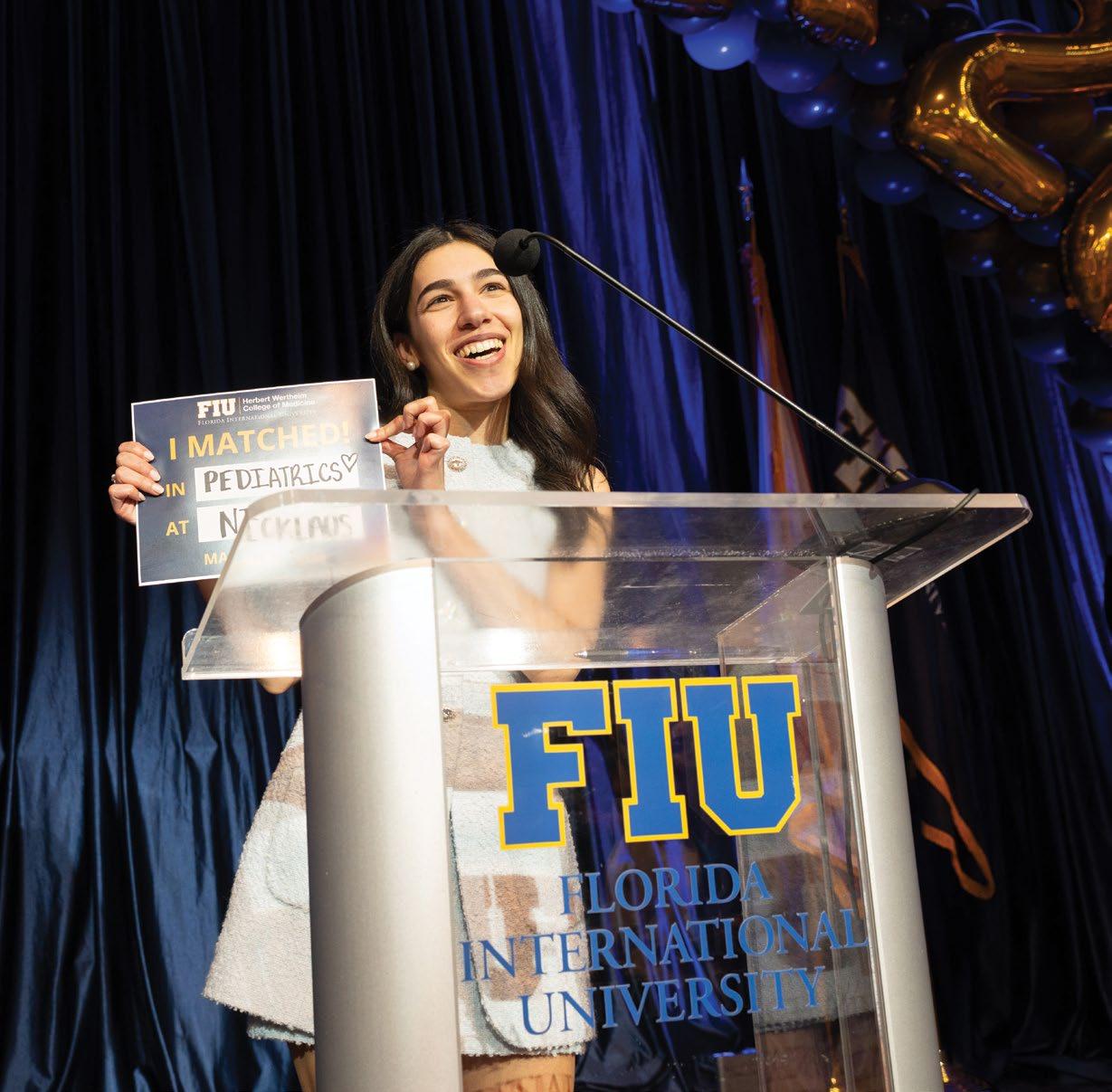
Samantha Taño, M.D. ’25 celebrates her “match” in pediatrics at Nicklaus Children’s Hospital in Miami.
The Class of 2025 achieved a 100% placement rate on Match Day.


A LEGACY OF CARE ACROSS GENERATIONS
By Juan C. Cendan, M.D.
As the Herbert Wertheim College of Medicine continues to carve its place in medical education, research and clinical care, a powerful narrative emerges — one of transformation, collaboration and a bold vision for the future.
This year, our college magazine embraces a theme that captures FIU’s evolution: laying the foundational pieces for a comprehensive continuum of care, from infancy to geriatrics, that serves South Florida and beyond. This is not just a story of institutional growth but a testament to FIU’s commitment to addressing the diverse health needs of our community through strategic partnerships, innovative research and a steadfast dedication to training the next generation of physicians.
A FOUNDATION FOR COMPREHENSIVE CARE
Last year, we celebrated the transformative academic alliance with Baptist Health, a milestone that solidified FIU’s role as a rising force in medical education. This year, we build on that foundation with an expanded vision, marked by a groundbreaking partnership with Nicklaus Children’s Health System and strengthened ties with the Miami VA Healthcare System and Leon Medical Centers. These alliances form the cornerstones of a medical ecosystem that spans the entire patient care lifecycle. We now have the biggest pieces that a medical school needs, foundationally, to build academic programs, research programs and clinical programs.
Adding Nicklaus Children’s as a pediatric partner complements the adult-focused Baptist Health alliance, creating a seamless bridge from pediatric to adult care. Meanwhile, the collaboration with the Miami VA and Leon Medical Centers provides specialized geriatric care, ensuring that FIU’s reach extends to our aging population. This unique combination — pediatrics, adult medicine, and geriatrics — sets FIU apart, positioning FIU Medicine as a leader in addressing the full spectrum of health needs.
While these partnerships are still nascent, the early successes are undeniable. The passage of House Bill 907, which establishes the Florida Institute for Pediatric Rare Diseases, marks a significant step forward. With FIU and Nicklaus Children’s as voting members, this initiative will channel $25 million annually into screening and research for rare genetic disorders, offering hope to families across Florida. This achievement underscores the power of collaboration.
FROM THE DEAN
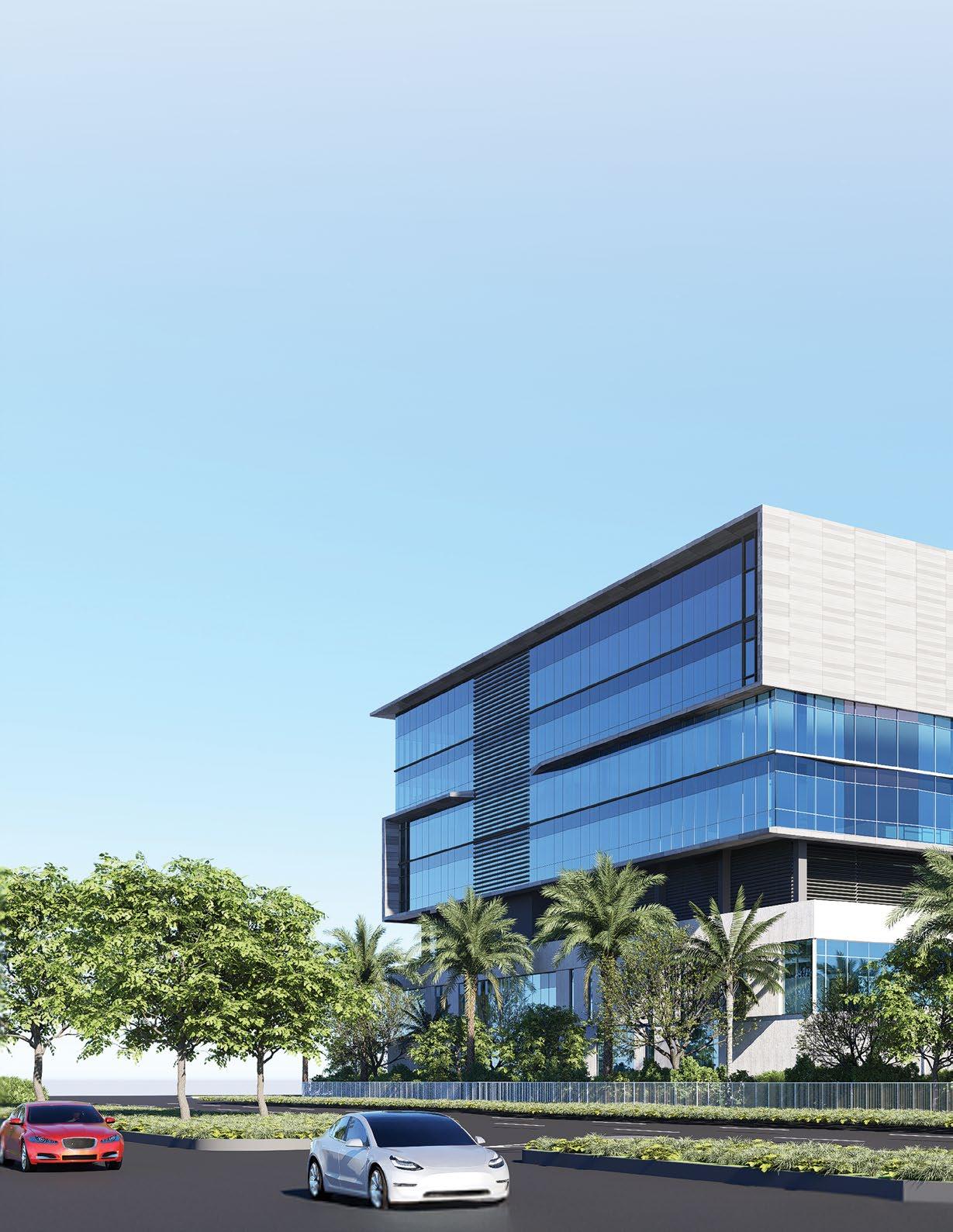
Joint faculty hires further illustrate the strength of these alliances. Dr. Makoto Hashimoto brings cutting-edge robotic surgery skills to South Florida, a recruitment made possible through the combined efforts of FIU and Baptist Health. Similarly, at Nicklaus Children’s, pediatric heart surgeon Dr. David Kalfa and cardiologist Dr. Shyam Sathanandam have joined the ranks, drawn by the opportunities afforded by university affiliation.
These hires enhance clinical care and elevate FIU’s academic and research profile. At the Miami VA and Leon Medical Centers, the search for a new leader in geriatric research and education promises to further strengthen our geriatric care initiatives.
These early wins are more than isolated achievements; they signal the beginning of a transformative era for FIU Medicine. By fostering collaborations that attract top talent and drive innovation, we are enhancing the quality of care available to our community. These partnerships create a stronger bond for our students, ensuring access to diverse patient populations and clinical experiences critical to their training.
BRIDGING GAPS IN CARE
One of the most compelling aspects of FIU’s vision is its potential to address critical gaps in health care, particularly for patients transitioning from pediatric to adult care.
Survivors of childhood disorders, such as leukemia or cystic fibrosis, often face a fragmented health care system as they age out of pediatric care. There’s no clear roadmap for managing this growing group of now-adults who overcame serious illnesses in childhood or survived something terrible when they were little. FIU’s unique position creates an opportunity to build programs that address this transition, ensuring continuity of care for these vulnerable patients.
Architectural rendering of the new academic medical center by Stantec.
FROM THE DEAN
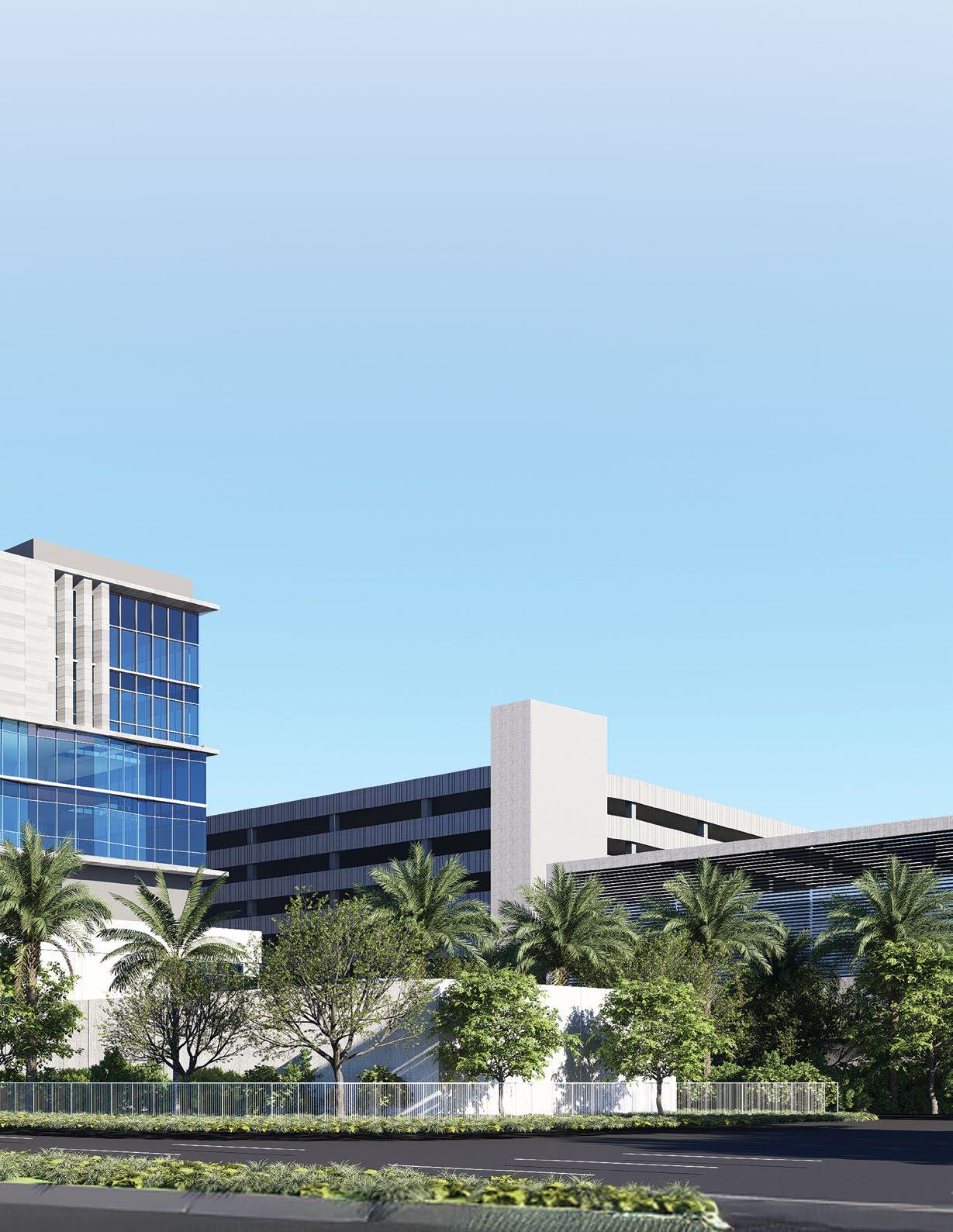
This focus on continuity extends to the community, where FIU’s presence is increasingly felt. From the elderly patients at Leon Medical Centers who benefit from interactions with FIU students to the families seeking care at Baptist Health and Nicklaus Children’s, the community is beginning to see FIU Medicine as a trusted partner in health.
ON THE HORIZON
Looking ahead, FIU Medicine is poised to amplify its impact through increased research funding and a new state-of-the-art medical education building in clinical partnership with Baptist Health. The $160 million allocated by the state, the largest in FIU’s history, will create a centerpiece for medical education and community engagement. This facility, aligned with our aspirations
to climb the NIH research rankings, reflects a commitment to excellence in education and discovery.
Yet, the true measure of FIU’s success lies in its ability to serve the community. Whether through training physicians who understand the unique needs of South Florida’s diverse population or pioneering research into rare diseases, FIU Medicine is building a legacy of care that transcends generations. We’re not at “mission accomplished,” but the pieces are now in place.
This magazine invites you to explore the stories of transformation unfolding at FIU Medicine. From the joint hires redefining clinical care to the students gaining hands-on experience across our partner institutions, each narrative reflects our commitment to building a healthier future. We invite our community — students, faculty, alumni, and partners — to join us in this journey. Together, we can bridge gaps, innovate care and ensure that FIU Medicine remains a beacon of hope and healing for all.
Dr. Juan C. Cendan
Dean, Herbert Wertheim College of Medicine
Senior Vice President for Health Affairs, FlU
Creating a legacy of care
FIU-Baptist partnership attracts and retains top physicians through graduate medical education programs, clinical collaborations

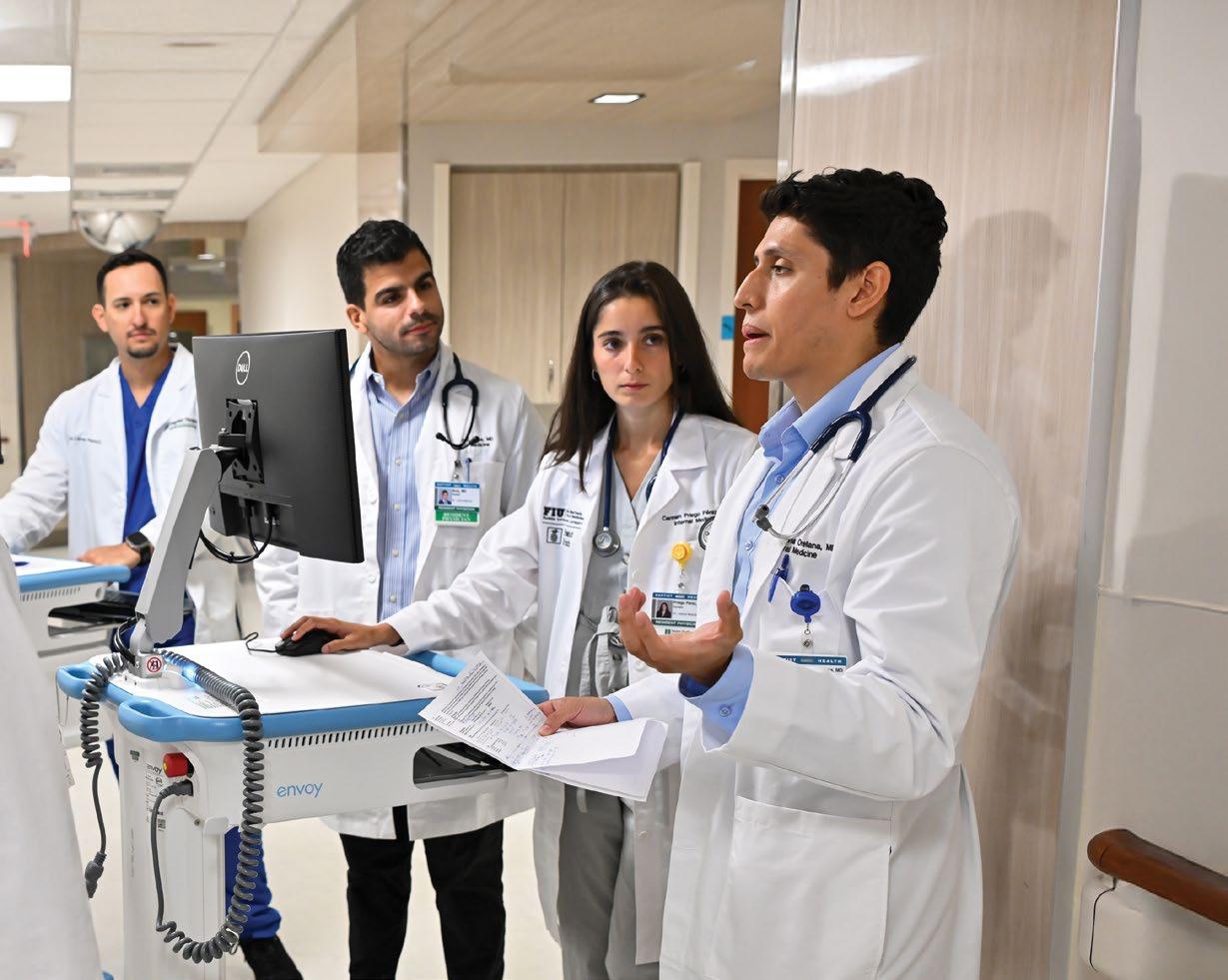
In a bustling neurology ward at Baptist Health Baptist Hospital in Miami, Carlos Lezcano, M.D. ’25 begins his day as a first-year resident. A Miami native and recent graduate of the Herbert Wertheim College of Medicine, Lezcano is part of a new wave of physicians training under a groundbreaking partnership between FIU and Baptist Health South Florida. Launched in 2024, this alliance is addressing Florida’s looming physician shortage while strengthening medical education and patient care.
For Lezcano, the opportunity to train in his hometown is personal. “I grew up watching my grandfather struggle with Parkinson’s disease,” he says. “It drove me to neurology and to stay in Miami to help my community.”
This partnership is more than a training ground for doctors like Lezcano. It’s a strategic response to a critical health care
challenge, combining FIU’s academic excellence with Baptist Health’s clinical expertise to produce physicians who are skilled, compassionate and likely to stay in South Florida.
Through expanded graduate medical education (GME) programs, innovative clinical collaborations and a focus on community health, the FIU-Baptist Health alliance is transforming the region’s health care landscape.
GROWING HEALTH CARE CRISIS
Florida faces a dire physician shortage, with a projected deficit of 18,000 doctors by 2035. South Florida, with its rapidly growing and aging population, is particularly hard-hit. Twenty percent of the state’s physicians are nearing retirement, and demand for primary care and specialties like neurology, internal medicine and general surgery is outpacing supply. The result:
Program Director Dr. Seema Chandra (left foreground) leads internal medicine residents as they begin their first day of training.
Wertheim

longer wait times, strained health care systems and limited access to care, especially in poorer communities.
The FIU-Baptist Health partnership directly addresses this crisis by expanding GME programs, which are critical for training physicians who tend to practice where they train. According to the Association of American Medical Colleges, 57.1% of physicians who completed residency in Florida between 2013 and 2022 stayed in the state, with nearly 80% remaining if they also attended medical school locally. By focusing on local training, the partnership aims to build a sustainable health care workforce for South Florida.
NEW ERA FOR GRADUATE MEDICAL EDUCATION
FIU is now the official sponsoring institution for all joint FIU-Baptist Health GME programs, overseeing a suite of Accreditation Council for Graduate Medical Education (ACGME)accredited residencies and fellowships. Residents and fellows train across Baptist Health’s network, including Baptist Hospital,
South Miami Hospital, West Kendall Baptist Hospital and Doctors Hospital. Baptist Hospital is on track to become a statutory teaching hospital, a designation that will expand its capacity for medical education, clinical research and advanced patient care.
In July 2025, the partnership launched nine residency and fellowship programs, welcoming 68 trainees from medical schools nationwide. New programs include residencies in internal medicine, neurology and general surgery, with diagnostic radiology and urology residencies set to begin in July 2026. Five existing Baptist Health programs — residencies in family medicine and interventional radiology, and fellowships in primary care sports medicine, orthopedic sports medicine and orthopedic hand surgery — have transitioned under the FIU-Baptist Health umbrella.
Over the next five years, the alliance plans to grow to approximately 350 residents and fellows, with a goal of establishing at least 24 programs targeting specialties with significant shortages.
The inaugural FIU/Baptist Health residents gather on their first day of training at Baptist Hospital’s iconic pineapple fountain.
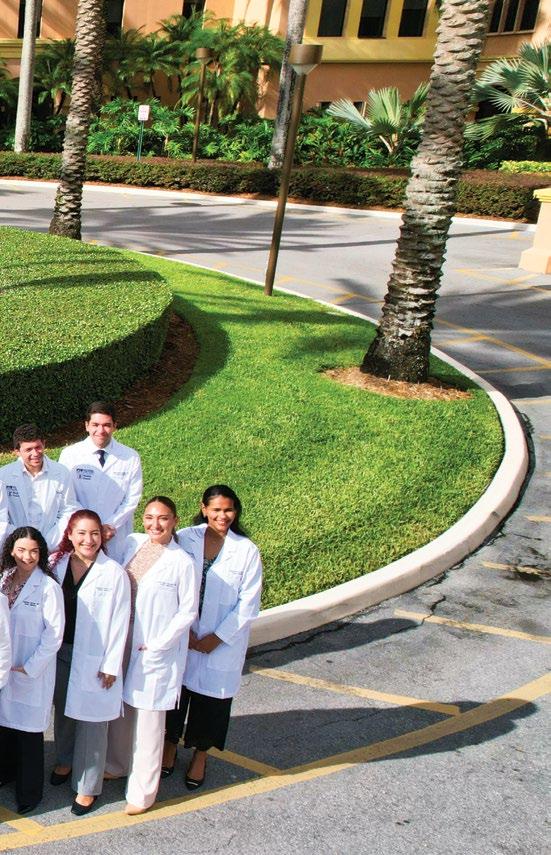
“This partnership is a major step toward training more doctors for South Florida,” says Dr. Juan C. Cendan, dean of FIU Medicine and senior vice president for Health Affairs at FIU. “We’re combining Baptist Health’s high-quality clinical care with FIU’s academic standards to produce physicians who will serve our community effectively.”
LOCAL COMMITMENT
Lezcano’s story illustrates the partnership’s impact. He is training under Dr. Diego Torres-Russotto, chair of neurology and distinguished endowed chair in neurology at Baptist Health Miami Neuroscience Institute, and program director of the FIU/ Baptist Health Neurology Residency, who emphasizes the broader impact of medical education.
“This is a very important investment in the growth of young physicians and the health of our community,” Torres-Russotto says. “When I’m in my clinic, I am helping one, two or three patients at a time. But by training other physicians, I can eventually be helping thousands of patients.”
“This is a very important investment in the growth of young physicians and the health of our community...by training other physicians, I can eventually be helping thousands of patients.”
Dr.
Diego Torres-Russotto FIU/Baptist Health Neurology Residency Program Director
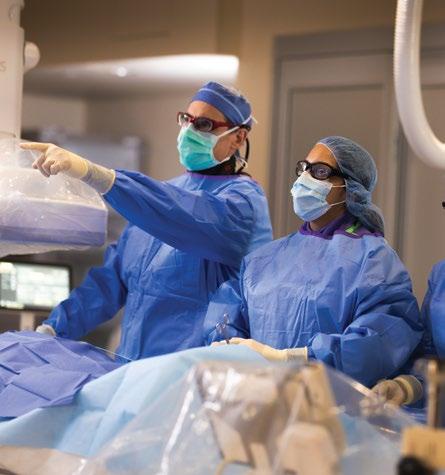
Lezcano values the opportunity to train in Miami. “Staying close to my family and community while starting my career is a privilege,” he says.
His commitment mirrors that of other residents, like Dr. Maria Jacome Llovera, who also chose neurology due to a family member’s neurological condition.
“I know firsthand what it is to deal with the complexity of a neurological disease,” she says. “I’m feeling very excited and grateful to be here. It’s a great institution that offers the best care to patients, and I’m excited for all the things I’m going to learn.”
The neurology residency, based at Baptist Hospital and Miami Neuroscience Institute, equips residents with skills to treat complex conditions like stroke, epilepsy and movement disorders, addressing a critical need in South Florida’s aging population. The General Surgery Residency, led by Dr. Christopher Senkowski, is equally focused on producing skilled, community-oriented physicians.
Program Director Dr. Brian Schiro with interventional radiology fellow Dr. Daniela Garcia.

Dr. Sudhagar Thangarasu appointed Designated Institutional Official
Dr. Sudhagar Thangarasu, appointed in 2025 as the Designated Institutional Official (DIO) and associate dean for Graduate Medical Education at FIU’s Herbert Wertheim College of Medicine, brings a lifelong passion for teaching to his leadership role.
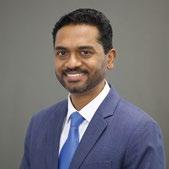
“Training the next generation of physicians is about more than medicine — it’s about creating a lasting impact on our community by delivering compassionate, high quality care to every patient,” Dr. Thangarasu says.
As DIO, Thangarasu bridges FIU’s academic credentials with Baptist Health’s clinical expertise, ensuring robust training programs that address regional health care needs.
“Surgery is very competitive. I wanted an eclectic group of excellent, caring surgeons who want to stay in South Florida,” he says. “I want them to be academic leaders one day, chairs of departments, the best surgeons. We have a wonderful team. The potential is tremendous.”
The Internal Medicine Residency is the largest of the programs. Led by Dr. Seema Chandra, it emphasizes patient-centered care and interdisciplinary collaboration, preparing residents to meet the region’s diverse health care needs.
CLINICAL COLLABORATION ADVANCING CARE, INNOVATION
Beyond GME, the FIU-Baptist Health partnership is driving clinical innovation.
A key milestone is the joint recruitment of Dr. Makoto Hashimoto, an internationally renowned cardiac surgeon, as a professor and director of robotic cardiac surgery at FIU Medicine. Since December 2024, Hashimoto has been treating patients at Baptist Health Miami Cardiac & Vascular Institute and
Dr. Rupa Seetharamaiah (center) leads a surgical simulation as FIU medical student Abhinav Balu observes. Opposite page: Neurology resident Dr. Carlos Lezcano celebrates the first day of residency with Roary, FIU’s mascot.
performing surgeries at Baptist Hospital and South Miami Hospital. His expertise in robotic and minimally invasive cardiac procedures offers patients faster recovery times and better outcomes compared to traditional open-heart surgery.
“His skills in robotic surgery will transform cardiac care here,” says Dr. Tom C. Nguyen, chief medical executive of Miami Cardiac & Vascular Institute and chair of the Department of Cardiovascular Sciences at FIU Medicine.
Baptist Hospital’s path to becoming a statutory teaching hospital is another critical component of the clinical collaboration. This status will enhance opportunities for medical education, research and patient care.
“This is a significant step forward,” says Bo Boulenger, president and CEO of Baptist Health. “It will allow us to expand training, conduct innovative research and improve health outcomes for our community.”
The partnership also integrates FIU Health, the College of Medicine’s clinical faculty group practice, with the Baptist Health Medical Group as of July 2025. This move streamlines clinical operations and enhances access to primary and specialized care at the FIU Health clinic on campus.
While FIU Health supports community health initiatives, the broader clinical collaboration leverages Baptist Health’s extensive network to deliver high-quality care across South Florida.
supply of doctors who understand the region’s cultural and health care needs.
“We’re building a workforce that’s invested in this community,” Chandra says. “Our residents are learning to deliver care that’s both clinically excellent and culturally competent.”

LOOKING AHEAD: A PIPELINE OF PROGRESS
The FIU-Baptist Health alliance is strategically designed to address South Florida’s physician shortage by training doctors in highdemand specialties. The new residencies in internal medicine, neurology and general surgery target areas with significant health care gaps. For example, the Internal Medicine Residency prepares physicians to handle the complex needs of Miami’s population, while the Neurology Residency addresses the growing demand for specialists to treat aging-related conditions. The General Surgery Residency aims to produce surgeons who will stay and practice in the region, reducing the shortage of surgical expertise.
The partnership’s focus on local training is key. Physicians who train in South Florida are more likely to stay, ensuring a steady
The FIU-Baptist Health partnership is already planning for the future. With a goal of establishing at least 24 GME programs, the alliance is exploring specialties like cardiology and oncology to address ongoing shortages. The Diagnostic Radiology Residency, set to launch in July 2026, will enhance the region’s capacity for advanced imaging, a critical tool in modern diagnostics.
A planned 163,000-square-foot medical center on FIU’s main campus, funded by a $160 million state appropriation and operated by Baptist Health, will serve as a hub for interdisciplinary education and clinical services, further expanding the partnership’s reach.
The alliance also supports community health through initiatives like the Green Family Foundation NeighborhoodHELP program, which provides free primary care and behavioral health services in the community. While FIU Health plays a role in these efforts, the partnership’s broader clinical network ensures that residents across Miami-Dade County have access to quality care.
LASTING IMPACT
Back in the neurology ward, Lezcano reflects on his first weeks as a resident.
“Every day is a chance to learn and make a difference,” he says. His journey embodies the promise of the FIU-Baptist Health partnership: to train physicians who are skilled, compassionate and committed to their community.
As the alliance grows, with new programs in the pipeline and Baptist Hospital poised to become a statutory teaching hospital, its impact will be felt for generations. By addressing the physician shortage, advancing clinical care and fostering medical education, FIU and Baptist Health are building a healthier South Florida. For patients, physicians and the community, this partnership is a commitment to a brighter future — one where quality care is within reach for all.

A NEW DAWN for pediatric care in South Florida
The FIU Herbert Wertheim College of Medicine and Nicklaus Children’s Health System have joined forces to revolutionize pediatric health care, education and research in South Florida. This dynamic partnership merges FIU’s cutting-edge research with Nicklaus Children’s unmatched clinical expertise, promising to transform the lives of children and families across the region and beyond.
As South Florida’s leading public research university, FIU brings an innovative spirit and robust research infrastructure to the table. Nicklaus Children’s, the region’s only specialty-licensed children’s hospital, serves 70% of Miami-Dade’s children and boasts the Southeast’s largest pediatric teaching program. Together, they’re forging a powerhouse alliance that will deliver faster diagnoses, pioneering treatments and a new generation of highly skilled pediatric specialists.
“This partnership is a game-changer for pediatric health care,” said Matthew A. Love, president and CEO of Nicklaus Children’s Health System. “By combining FIU’s research innovation with Nicklaus Children’s clinical excellence, we’re not just treating illnesses — we’re creating a future where every child has access to world-class care and life-changing therapies close to home.”
Dr. Juan C. Cendan, dean of the Herbert Wertheim College of Medicine, shares this vision. “At FIU, we’re driven by communityfocused innovation. Partnering with Nicklaus Children’s allows us
FEATURE STORY
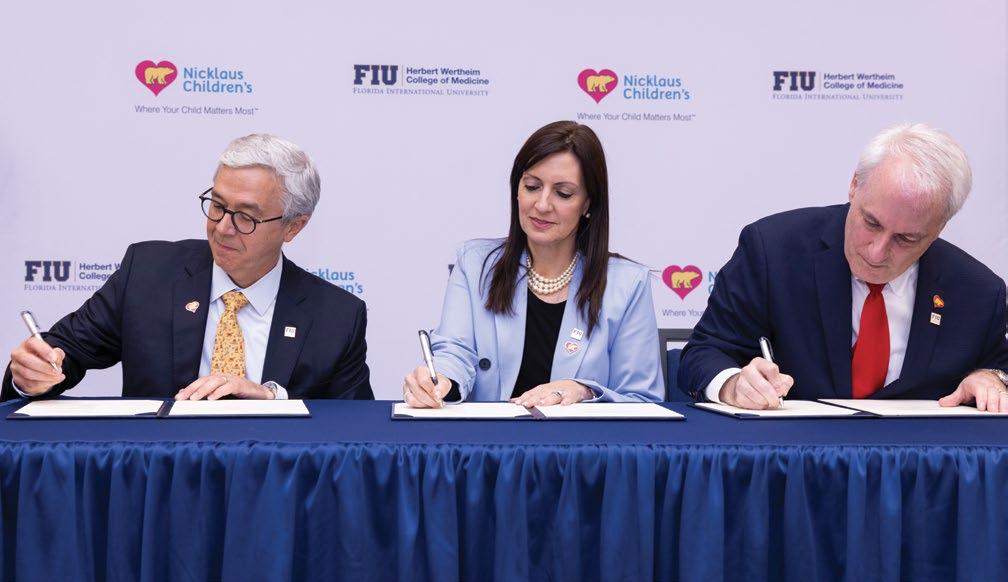
to train physicians who understand the needs of South Florida’s families while advancing research that will lead to transformative cures.”
TRAINING TOMORROW’S PEDIATRIC HEROES
Education is at the heart of this alliance. Each year, around 120 FIU medical students complete pediatric clerkships at Nicklaus Children’s, gaining hands-on experience in a world-class environment. The expanded partnership will enrich these opportunities, ensuring future physicians are equipped to meet the unique challenges of pediatric care in South Florida’s vibrant communities.
Dr. Stephanie San Martin ’19, an FIU alumna and attending physician at Nicklaus Children’s, is a living testament to the partnership’s potential impact.
“As an FIU student, I found my calling at Nicklaus Children’s,” she said. “The training I received here gave me the tools to make a real difference in children’s lives. This collaboration is building a legacy of compassionate, skilled doctors who will serve our community for decades.”
Cendan emphasized, “Our students aren’t just learning medicine — they’re learning to care for South Florida’s children with empathy and expertise. This partnership ensures our graduates are ready to lead in pediatric care and research.”
TACKLING A NATIONAL CRISIS
The partnership comes at a critical time. With a projected shortage of 13,000 pediatric specialists by 2037, FIU and Nicklaus Children’s are stepping up by expanding graduate medical education programs, including residencies and fellowships. Their goal? To train more pediatricians and attract top physician-researchers to South Florida, addressing the needs of the 15 million American children with rare diseases and other complex conditions.
One of the partnership’s most exciting advancements is rapid whole genome sequencing (rWGS), a cutting-edge tool that slashes diagnostic wait times for complex conditions from months to days. By tailoring treatments to a child’s unique genetic profile, this technology is a lifeline for families on grueling “medical odysseys.”
(left to right) Dr. Juan C. Cendan, dean, Herbert Wertheim College of Medicine; FIU President Jeanette M. Nuñez; Matthew A. Love, president and CEO, Nicklaus Children’s Health System.
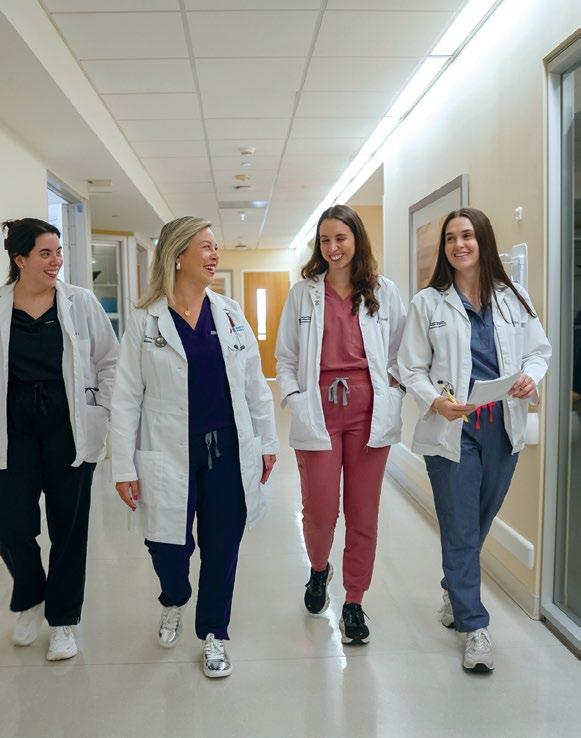
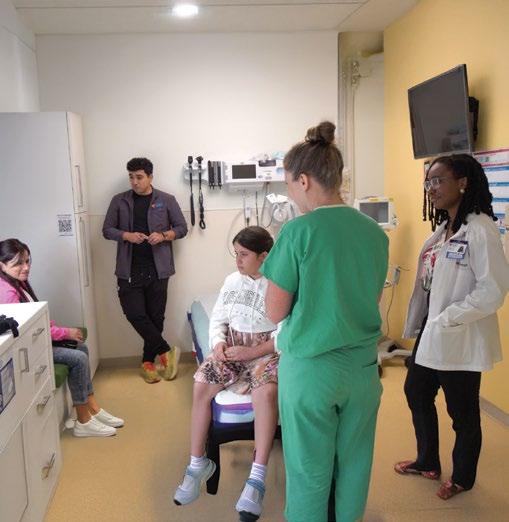
“This partnership is a beacon of hope for families battling rare diseases. It’s setting a standard for the nation.”
“With rapid whole genome sequencing, we’re delivering answers and hope faster than ever,” said Love. “This isn’t just about diagnosing conditions — it’s about personalizing care to save lives.”
Cendan added, “Precision medicine is the future, and we’re bringing it to South Florida. No child should face an undiagnosed or untreated condition due to a lack of expertise or resources.”
A NATIONAL MODEL ROOTED IN COMPASSION
The partnership is already making waves with initiatives like the Sunshine Genetics Act, inspired by State Representative Adam Anderson’s personal loss of his son to Tay-Sachs disease. Anderson’s advocacy led to the Andrew John Anderson Rapid Whole Genome Sequencing Program and the Sunshine Genetics Consortium, which brings together FIU and research partners Nicklaus Children’s, the University of Miami, Florida State University, the University of Florida and the University of South Florida.
The Sunshine Genetics Act has established the new consortium as well as a five-year genetic newborn screening pilot program. Florida’s leading physicians and scientists will engage in collaborative research that uses personal genetic information to diagnose, treat and prevent diseases.
Rep. Adam Anderson, a state representative whose son Andrew died of a rare disease at age 4.
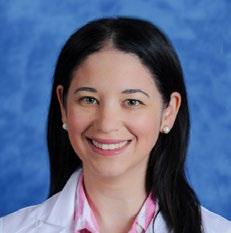
“This partnership is a beacon of hope for families battling rare diseases,” Anderson said during a visit to Nicklaus Children’s. “It’s setting a standard for the nation.”
By uniting academic and clinical excellence, the collaboration is tapping into the $100 billion genomic research industry, attracting corporate investment and research grants to fuel innovation. It’s a blueprint for addressing complex health challenges nationwide.
A VISION FOR THE FUTURE
As the partnership grows, FIU and Nicklaus Children’s are poised to draw top talent — like recently hired Dr. David Kalfa, a world-renowned pediatric cardiac surgeon — to secure transformative funding and develop groundbreaking therapies. With support from state leaders, private partners and the Sunshine Genetics Consortium, they’re positioning South Florida as a global hub for pediatric innovation.
“This is just the beginning,” said Cendan. “We’re building a future where South Florida leads the way in pediatric care, where families find hope and where children thrive.”
Love echoed, “Our vision is bold but achievable. Together, we’re creating a legacy of healing, discovery and hope for generations to come.”
This partnership isn’t just changing health care — it’s rewriting the future for South Florida’s children, one breakthrough at a time.
KEEPING HOMEGROWN HEROES FEATURE STORY
Alumna returns to South Florida for exceptional education, career
Dr. Stephanie San Martin ’19 embodies the transformative power of the partnership between FIU and Nicklaus Children’s. Born and raised in West Kendall, San Martin’s path to becoming an attending physician at Nicklaus Children’s began with her deep-rooted connection to her community.
“Growing up here, I always wanted to give back to South Florida,” she says.
After earning her undergraduate degree at the University of Florida and a master’s in Boston, San Martin returned home to attend Herbert Wertheim College of Medicine. Drawn to the college’s focus on social determinants of health and its innovative NeighborhoodHELP program, she found a unique opportunity to engage with local families.
“Following a household over years gave me a real perspective on how environment impacts health,” she recalls. “It shaped how I approach patient care.”
San Martin’s passion for pediatrics solidified during her clerkship at Nicklaus Children’s, where she was inspired by the hospital’s patient population and collaborative culture. After graduating, she completed her pediatric residency, served as chief resident and trained as a pediatric hospital medicine fellow at Nicklaus. In August 2025, she became an attending physician, caring for children admitted to the hospital’s general pediatric floors.
“Nicklaus exposed me to both routine and complex cases, making me a stronger clinician,” San Martin says. She values the hospital’s role as a regional hub, serving 70% of Miami-Dade’s children and patients from the Caribbean. Her work with FIU medical students, through lectures and rotations, allows her to mentor the next generation, a role she cherishes as an alumna.
As a mother to her toddler daughter, Olivia, and expecting her second child, San Martin brings a personal perspective to her practice.
“Being a parent has deepened my empathy for families,” she says.
Through the FIU-Nicklaus partnership, she sees a future where South Florida leads in pediatric care, training compassionate physicians like herself to serve the community she calls home.
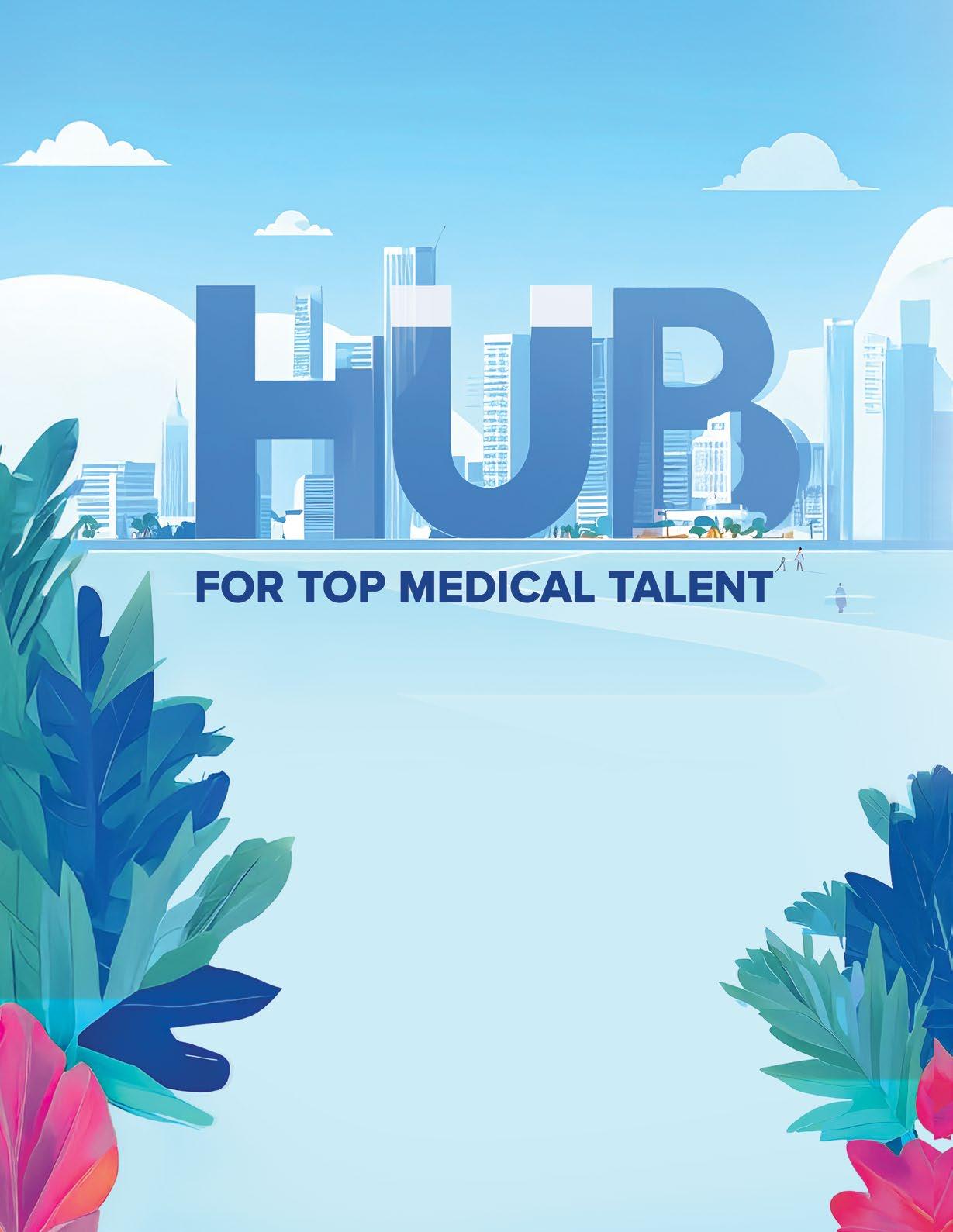
FIU MEDICINE, BAPTIST HEALTH AND NICKLAUS CHILDREN’S ATTRACT GLOBAL EXPERTS TO SOUTH FLORIDA
The strategic partnerships between the Herbert Wertheim College of Medicine, Baptist Health and Nicklaus Children’s Health System are driving transformative advancements in pediatric and cardiac care in South Florida. Through these collaborations, the institutions have welcomed two distinguished joint hires — Dr. David Kalfa and Dr. Makoto Hashimoto — whose expertise strengthens clinical care, medical education and groundbreaking research.
These appointments mark a significant milestone in the shared mission to elevate health care access and outcomes for children and adults across the region. By combining academic excellence with clinical expertise, the partnerships are fostering innovation and attracting world-class talent.
“Drs. Kalfa and Hashimoto exemplify the powerful pipeline our partnerships with Baptist Health and Nicklaus Children’s have created to recruit top-notch faculty and specialists. Their expertise will drive groundbreaking care, advance medical education, and inspire hope for families facing complex health challenges,” said Dr. Juan Cendan, dean of the FIU Herbert Wertheim College of Medicine.
MAKOTO HASHIMOTO, M.D.
Internationally acclaimed cardiac surgeon Dr. Makoto Hashimoto joined FIU Medicine and Baptist Health in December 2024, becoming the first major joint hire of the partnership. He is a professor and director of robotic cardiac surgery at FIU and sees patients at Baptist Health Miami Cardiac & Vascular Institute.
Specializing in robotic and minimally invasive cardiac procedures, Hashimoto offers patients faster recovery times than traditional open-heart surgery. “As a cardiac surgeon, I am guided by Leonardo da Vinci’s words: Simplicity is the ultimate sophistication,” he says.
Previously, Hashimoto led one of Japan’s largest heart programs at Sapporo University. His expertise is already transforming cardiac care in the region. “Our robotic surgery program is now the largest in Florida,” says Dr. Tom Nguyen, chief medical executive of Baptist Health Heart & Vascular Care and chair of Cardiovascular Sciences at FIU.
Hashimoto is also advancing medical education through research with FIU medical students like Natasha Mazinani, exploring the feasibility and outcomes of robotic procedures. One study shows how an atrioventricular septal defect with severe mitral regurgitation can be safely repaired using a fully robotic approach, potentially expanding the use of robotics over traditional sternotomy. Another compares Hashimoto’s first 100 robotic coronary artery bypass grafts (CABG) to his next 100, providing invaluable data for surgeons worldwide.

“Working with Dr. Hashimoto is incredibly rewarding,” says Mazinani. “It fuels my optimism for the future of medicine.”
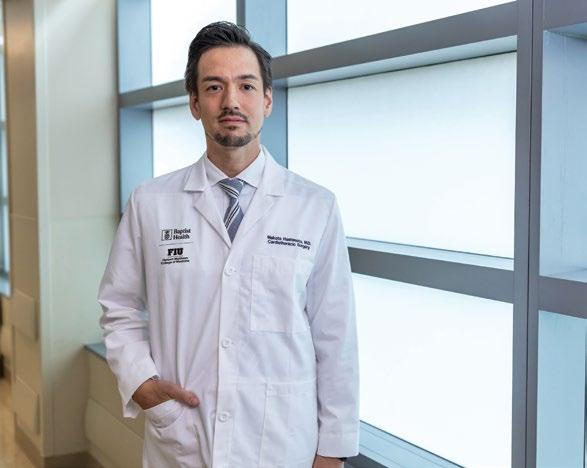

DAVID
KALFA, M.D., PH.D.
Dr. David Kalfa is a trailblazer in pediatric cardiac surgery. As the first FIU/Nicklaus joint hire of the FIU/Nicklaus Children’s academic partnership, he serves as chief of cardiovascular surgery and codirector of the Nicklaus Children’s Heart Institute and as a professor in the Departments of Pediatrics and Surgical Sciences at FIU.
Renowned for his expertise in complex neonatal cardiac surgery and advanced pediatric valve repair, Kalfa has pioneered minimally invasive techniques and tissue-engineered cardiovascular devices.
“Our goal is simple — deliver unparalleled care, elevate outcomes and make sure no child in South Florida has to leave home to receive world-class cardiac care,” Kalfa says.
Before moving to South Florida, Kalfa worked at Columbia University Irving Medical Center as the Florence Irving Associate Professor of Surgery and led programs at New York-Presbyterian Morgan Stanley Children’s Hospital.
Kalfa’s research — spanning AI-driven surgical planning, regenerative medicine and robotic surgery — focuses on improving long-term outcomes for children with congenital heart defects. Children born with valve defects, for example, often require multiple open-heart surgeries because current artificial valves cannot grow or self-repair. With a newly awarded NIH R01 grant, Kalfa is leading a study at FIU to help make donated living heart valves a viable, off-the-shelf option for these patients by enhancing valve preservation techniques and reducing immune rejection.

These groundbreaking appointments underscore the power of academic – clinical partnerships to elevate care and redefine the region’s medical landscape.

SCAN THE QR CODE
SCAN THE QR CODE

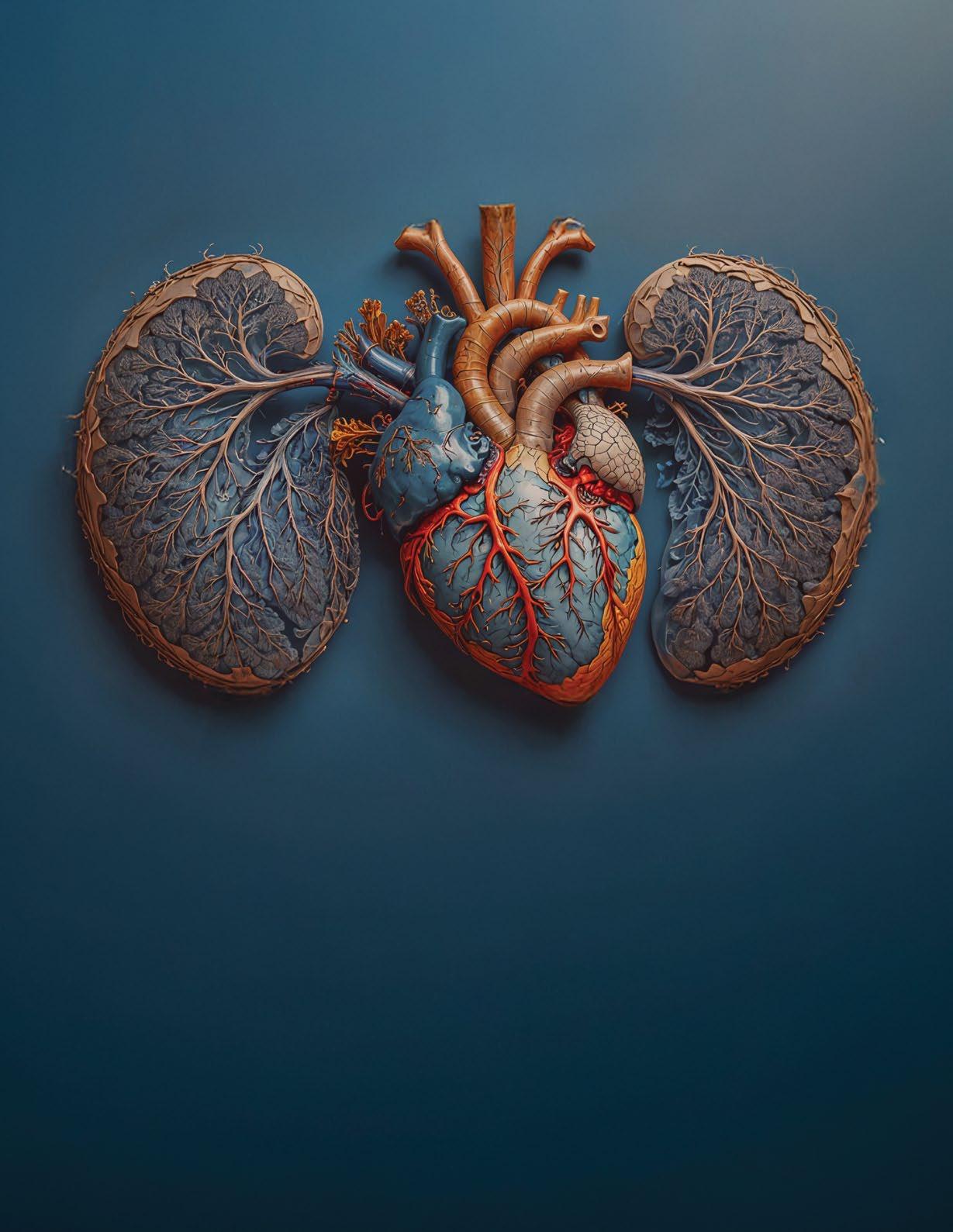
A SCIENTIFIC TRIFECTA

THREE NIH AWARDS FUEL TRANSLATIONAL LUNG RESEARCH
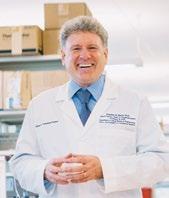
In one extraordinary week, three awards from the National Institute of Health’s National Heart, Lung, and Blood Institute affirmed the urgency and promise of Stephen Black’s work. Black, FIU Medicine’s associate dean for research, received more than $15 million to advance cardiovascular research.
Among them are two of the NIH’s most competitive awards: a P01 program project grant and an R01 research grant, underscoring both the scope and the innovation of Black’s work.
“These awards reflect not only the strength of our ideas but also the critical need for new strategies to treat devastating lung diseases,” Black says. “Each project moves us closer to translating discoveries from the bench to the bedside.”
METABOLIC REPROGRAMMING AND PULMONARY VASCULAR DISEASE ASSOCIATED WITH CONGENITAL HEART DISEASE RESULTING IN INCREASED PULMONARY BLOOD FLOW
This P01 project explores why some children with congenital heart defects develop pulmonary vascular disease, which damages lung blood vessels. Excess blood flow to the lungs causes the vessels to adapt in harmful ways, leading to stiffness and loss of function.
The research is testing a new idea: that a gene regulator (SOX18) and a metabolic pathway producing proline (an amino acid used to build collagen) drive these damaging changes. “We’re uncovering how blood vessel cells rewire under stress,” says Black. “By understanding these triggers, we can design interventions to protect the lung’s fragile vascular system and prevent irreversible disease.”
This is Black’s fourth P01 grant, his third at FIU.
MITO-INFLAMMATION AND SEPSIS-INDUCED ACUTE LUNG INJURY
This R01 award targets a deadly complication of sepsis — acute lung injury. Black’s lab previously discovered that the protein TLR4 triggers mitochondria — the “power plants inside cells — to produce excess harmful molecules called reactive oxygen species (ROS), which fuel lung inflammation.
This project builds on that work by studying how this breakdown in mitochondrial balance sustains inflammation and worsens injury. It also tests new ways to protect or restore healthy mitochondrial networks (in mice) to reduce lung damage during sepsis. The goal is to develop therapies that calm lung inflammation and improve survival in critically ill patients.
Black holds another R01 award currently investigating metabolic reprogramming of smooth muscle cells in pulmonary hypertension.
DEVELOPMENT OF NOVEL RHOA NITRATION INHIBITORY PEPTIDES FOR THE TREATMENT OF ACUTE LUNG INJURY
This project aims to develop new treatments for acute lung injury (ALI) and acute respiratory distress syndrome (ARDS) — life-threatening conditions where lung inflammation and leakage make breathing difficult. Current therapies rely on ventilation, but death rates remain high, especially with infections like COVID-19.
Black’s team previously found that a protein called RhoA, when altered by nitration, becomes overactive and disrupts the lung’s protective barrier of blood vessels, floods the lungs, damages mitochondria, and triggers runaway inflammation.
To counter this, they designed a small peptide, NipR1, that shields RhoA from nitration and protects lung function in early studies. The team now plans to create stronger, more drug-like versions of NipR1, test them in mice and pigs, and advance toward a new therapy for ALI/ARDS.
LEADERSHIP IN TRANSLATIONAL SCIENCE
$11.4M AWARDED
$2.8M $1M AWARDED AWARDED
A tenured professor and vascular biologist, Black plays a key role in advancing biomedical science in Florida and beyond. He oversees research at the Herbert Wertheim College of Medicine and directs the FIU Center for Translational Science in Port St. Lucie. He also serves on Florida’s Biomedical Research Advisory Council and is an MPI for the NIH-funded FIU Diversity Center for Genomic Research.
Black has spent his career studying how oxidative and nitrosative stress drive pulmonary hypertension, lung injury and stroke. His lab has been continuously funded for over 25 years, securing more than $65 million from the NIH and other major funders.


U N L CK IN G RE L I E F
RESEARCHERS WORK TO DECODE CHRONIC PAIN’S COMPLEX PUZZLE
In the bustling labs of the Herbert Wertheim College of Medicine, a quiet revolution is underway to ease the suffering of millions.
Led by Dr. Saurabh Aggarwal and Dr. Patricia Junquera, two groundbreaking clinical studies are tackling chronic pain’s mysteries. The researchers’ work offers hope for safer, opioid-free solutions.
ADULTS IN THE U.S. HAS CHRONIC PAIN 1 in 4

UNRAVELING PAIN IN HIV PATIENTS
The first study, NIH-funded, dives into the molecular roots of chronic pain in HIV patients.
Aggarwal, a tenured associate professor and translational researcher at the Herbert Wertheim College of Medicine, says, “Almost 80% of people with HIV experience chronic pain.” He notes the figure climbs to 87% locally. “Nothing helps them.”
Opioids, often the go-to treatment, carry risks of addiction and fuel the opioid crisis. Aggarwal aims to understand why these patients suffer widespread pain — described as a full-body malaise rather than localized aches. Their research has uncovered a key clue: HIV patients with chronic pain have drastically low levels of betaendorphins, the body’s natural painkillers.
“If a healthy person has 100 molecules of endorphins, these patients might have 25,” Aggarwal explains. “Their bodies don’t produce enough, so they feel constant pain.”
To explore this, the study is recruiting 200 patients across four groups: HIV-positive and negative, with and without chronic pain. Nearly 100 are enrolled, with blood samples analyzed for pain markers like cytokines and beta-endorphins.
A unique approach tests pain response using methylnaltrexone bromide, an FDA-approved drug for opioid-induced constipation. By blocking mu-opioid receptors, it reveals whether low endorphin levels drive pain.
“In healthy people, blocking these receptors increases pain,” Aggarwal says. “In HIV patients with low endorphins, pain stays the same — proof their natural pain relief is deficient.”
The goal? Develop drugs that boost endogenous opioids, reducing reliance on addictive fentanyl or morphine.
TRANSCUTANEOUS MAGNETIC STIMULATION FOR PAIN
The second study, in collaboration with Baptist Health, explores transcutaneous magnetic stimulation (TMS) to relieve posttraumatic and post-surgical chronic pain. TMS uses focused magnetic pulses to stimulate specific areas, traditionally for treating depression, OCD and migraines resistant to medication or therapy.
Recently, the FDA cleared the MagVenture TMS device — the only device approved for transdermal magnetic stimulation — for peripheral pain. However, its pain-relief mechanisms remain
RESEARCH
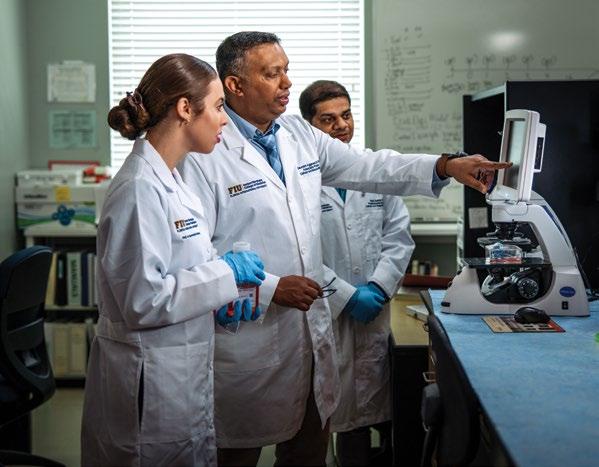
unclear. Junquera, chair of psychiatry and behavioral health at the College of Medicine, and Aggarwal are working to change that.
As a geriatric psychiatrist treating patients over 60, Junquera frequently encounters comorbid pain conditions like osteoarthritis, low back pain or migraines.
“A lot of my patients have comorbid pain conditions,” she says. “Sometimes you can’t figure out what came first — the pain causing depression or anxiety, or the mental health issues exacerbating the pain.”
Junquera’s experience with TMS for depression sparked her involvement.
“This machine I used for depression just got cleared for peripheral pain,” she recalls telling Aggarwal. “I said, ‘Wouldn’t it be interesting if we can treat pain with this machine? It’s much shorter than for depression — four to five sessions of 30 minutes, compared to 36 treatments of 19 minutes for depression.”
With a $7.5 million grant from the NIH, the team partnered with Dr. Eduardo Icaza, a comprehensive and interventional pain management physician at Baptist Health Miami Neuroscience Institute. Together, they’re conducting a pilot study, with 20 patients enrolled, aiming for 50 by mid-2026.
The study targets a diverse group, including middle-aged patients with low back pain, osteoarthritis or injuries. Over four days, patients receive 30-minute TMS sessions targeting pain sites, such as the shoulder or knee. Before and after, researchers measure pain levels, anxiety, depression, vascular function, glucose levels and inflammation markers like endorphins and cytokines.
“Eighty percent of patients show reduced pain after TMS,” Aggarwal says. “Their blood vessels dilate, producing more nitric oxide, which improves oxygen delivery to tissues.”
Junquera emphasizes the broader implications: “What causes pain is inflammation. If we’re not treating the inflammation, how are we helping these people? TMS offers a non-addictive alternative, reducing suffering and improving well-being without relying on pills.”
This suggests TMS counters central sensitization, where the body fails to produce enough pain-fighting molecules. The team presented preliminary data at the FIU-Baptist Health Research Symposium in September and has applied for a five-year NIH grant to further explore TMS’s impact on pain, inflammation, glucose levels and related conditions like heart disease and diabetes.
A COOPERATIVE ENVIRONMENT
Both studies benefit from FIU’s collaborative spirit.
“FIU offers a highly collaborative environment,” Aggarwal says. “In 15 months, we’ve enrolled nearly 100 patients for the HIV study — a huge leap from my time in Alabama, where we managed 15-20.”
Partnerships with Baptist Health and the Miami Center for AIDS Research, which connects researchers to 10,000-12,000 HIV patients, accelerate progress. Leaders like Stephen Black, associate dean for research at the College of Medicine, and Christopher Grayson, FIU’s director of research integrity, have been instrumental.
“Their enthusiasm is infectious,” Aggarwal notes. “They hold your hand, pushing you forward.”
Junquera echoes the collaborative ethos: “Working with Baptist Health and Dr. Icaza allowed us to create a protocol that mimics the FDA clearance but digs deeper into how TMS works for pain.”
Aggarwal’s vision for 2030 is bold: a drug that boosts natural endorphins, slashing opioid use.
Junquera shares this optimism, advocating for non-addictive solutions. “We’ve created a generation of addiction with pills. We need to think outside the box for pain and mental health, reducing stigma and suffering.”
By unraveling pain’s mechanisms — whether in HIV, cancer or fibromyalgia — FIU’s research, amplified by its Baptist Health partnership, could transform lives. For patients trapped in the grip of pain, Aggarwal and Junquera’s work is a beacon of hope, proving South Florida’s collaborative spirit can change medicine.
PROMISING NEW DRUG CANDIDATE
FOR ALZHEIMER’S
Amyloid plaques are a major focus of Alzheimer’s research and drug development efforts worldwide. But there’s another less understood hallmark of the disease, suspected to play an underlying role in its progression: chronic neuroinflammation. Could blocking these inflammatory waves ward off cognitive impairment?
U N L CK IN G RE L I E F
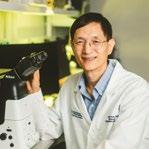
Through a promising new Alzheimer’s treatment discovery, FIU Medicine researcher Kyung Bo Kim has found an answer: Yes. Kim targeted the proteasome, the cellular process responsible for round-the-clock removal of specific proteins compromising cell survival. He previously helped create drugs that interfere with this process in cancer cells to destroy them, including FDA-approved anti-cancer medication carfilzomib. This time, Kim turned his attention to immunoproteasome, a special proteasome found in immune cells, and tied to inflammatory responses. Unusually high levels have been detected in the brains of people with Alzheimer’s disease.
With funding from the National Institute on Aging, Kim identified immunoproteasome inhibitor compounds that controlled inflammation. When tested on Alzheimer’s mouse models, cognitive function improved regardless of amyloid plaque buildup — an encouraging sign this treatment could benefit those at any stage of Alzheimer’s.
Next up: the investigational new drug enabling study, a crucial step before applying for clinical trials. Kim’s exploring how these same compounds could stop other diseases. So far, they’ve proven highly effective at stopping age-related macular degeneration, a cause of blindness.
“I feel like I’m in a new frontier of Alzheimer’s research — investigating immunoproteasome’s role in Alzheimer’s progression. Now we’re even closer to a drug that could be used in combination with other drugs to help patients and that’s so exciting.”
– Kyung Bo Kim Professor, Herbert Wertheim College of Medicine; Center for Translational Science
DISEASE-FIGHTING DISCOVERY
RESEARCHERS TARGET DEVASTATING DISEASES WITH BREAKTHROUGH COMPOUND



Stephen Black, Ph.D.
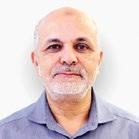
Ateam of FIU scientists is forging a path to combat two devastating conditions: Parkinson’s disease and acute lung injury. At the heart of their work is a protein called dynamin-related protein 1 (DRP1), which controls how mitochondria — the powerhouses of cells — divide and function. When DRP1 becomes overactive, it triggers harmful processes that fuel disease progression.
Researchers Kim Tieu, Stephen Black and Adel Nefzi have collaborated to develop a promising compound, CTS2444-32, that could slow Parkinson’s disease and protect lungs from life-threatening injury. Their work, fueled by FIU’s collaborative spirit and robust resources, offers a beacon of hope for patients facing these debilitating conditions.
Tieu, a professor of environmental health sciences at FIU Stempel College, has spent years studying DRP1’s role in Parkinson’s, a disease marked by tremors, stiffness and the loss of brain cells.
“DRP1 controls mitochondrial division,” Tieu explains. “When it’s overactive, it causes excessive splitting, leading to cell death and inflammation that drive Parkinson’s progression.”
Tieu’s lab developed a high-throughput assay to screen compounds that tame DRP1’s activity, initially partnering with University of Florida-Scripps Institute Molecular Screening Center to test FDA-approved drugs. A subsequent connection with FIU Center for Translational Science (CTS) sparked a breakthrough. Black, CTS director and associate dean for research at the College of Medicine and an expert in acute lung injury, discovered that DRP1’s overactivity also drives damage in conditions like sepsis and ventilator-induced lung injury (VILI), where lungs fill with fluid, endangering lives.
“In our models, DRP1 triggers mitochondrial dysfunction, releasing harmful reactive oxygen species that cause inflammation and tissue damage,” Black says.
Kim Tieu, Ph.D.
Adel Nefzi, Ph.D.
Recognizing their shared target, Tieu and Black teamed up, leveraging FIU’s resources to identify a novel compound. Nefzi, a medicinal chemist at the College of Medicine, provided a critical piece.
“Our 35-million-compound library allowed us to screen and identify CTS2444-32, a potent DRP1 inhibitor with a unique chemical structure designed for precision,” Nefzi says.
Their collaboration yielded CTS2444-32, a compound that inhibits DRP1 by up to 45%, as shown in preclinical tests. In Tieu’s Parkinson’s models, it reduced neuroinflammation and the buildup of toxic proteins like alpha-synuclein, a hallmark of the disease.
“This isn’t just symptom relief like current treatments, which only replace missing chemicals,” Tieu says. “CTS2444-32 is potentially disease-modifying, protecting brain cells and slowing Parkinson’s progression.”
In Black’s lung injury models, CTS2444-32 significantly reduced inflammation and oxidative stress, protecting mice from VILI within 24 hours.
“We saw reduced levels of inflammatory molecules in lung fluid, showing the compound’s ability to stabilize mitochondria and prevent damage,” Black says. “We tested a drug in animals in under a month — that’s lightning speed.”
Nefzi highlights the compound’s versatility: “CTS2444-32 targets multiple disease pathways with a single drug, offering hope for conditions beyond Parkinson’s and lung injury, such as Alzheimer’s, heart disease and even certain cancers.”
The team was awarded a patent for the compound. They note its potential to treat neurodegenerative diseases, cardiovascular

disorders and cancers by addressing mitochondrial dysfunction, oxidative stress and autophagy impairments.
FIU’s collaborative environment and resources, including its patent office, made the development and patenting of CTS2444-32 possible.
“FIU breaks down silos,” Black says. “We had experts in drug screening, chemistry and animal models working seamlessly.” Tieu adds, “The patent office and access to a vast compound library were game-changers.”
The team is now refining CTS2444-32, testing derivatives to improve solubility and bioavailability for human use. Black anticipates a paper on lung injury findings within six months, with clinical trials possibly a year away.
The researchers are also scaling up to large animal models, like pigs, to meet FDA requirements for clinical trials.
FIU’s vision fuels this progress, with NIH funding doubling to $12 million annually and a goal of $30 million by 2030.
“We’re training the next generation to build a biotech hub in South Florida,” Black says, emphasizing the local impact.
For patients, CTS2444-32 offers hope. Parkinson’s patients could experience slower disease progression, while those in intensive care with acute lung injury might survive conditions with 30-40% mortality rates, such as acute respiratory distress syndrome.
“Seeing a compound move from the lab to potential treatment is why I do this,” Tieu says.
Black agrees. “This is about saving lives.”
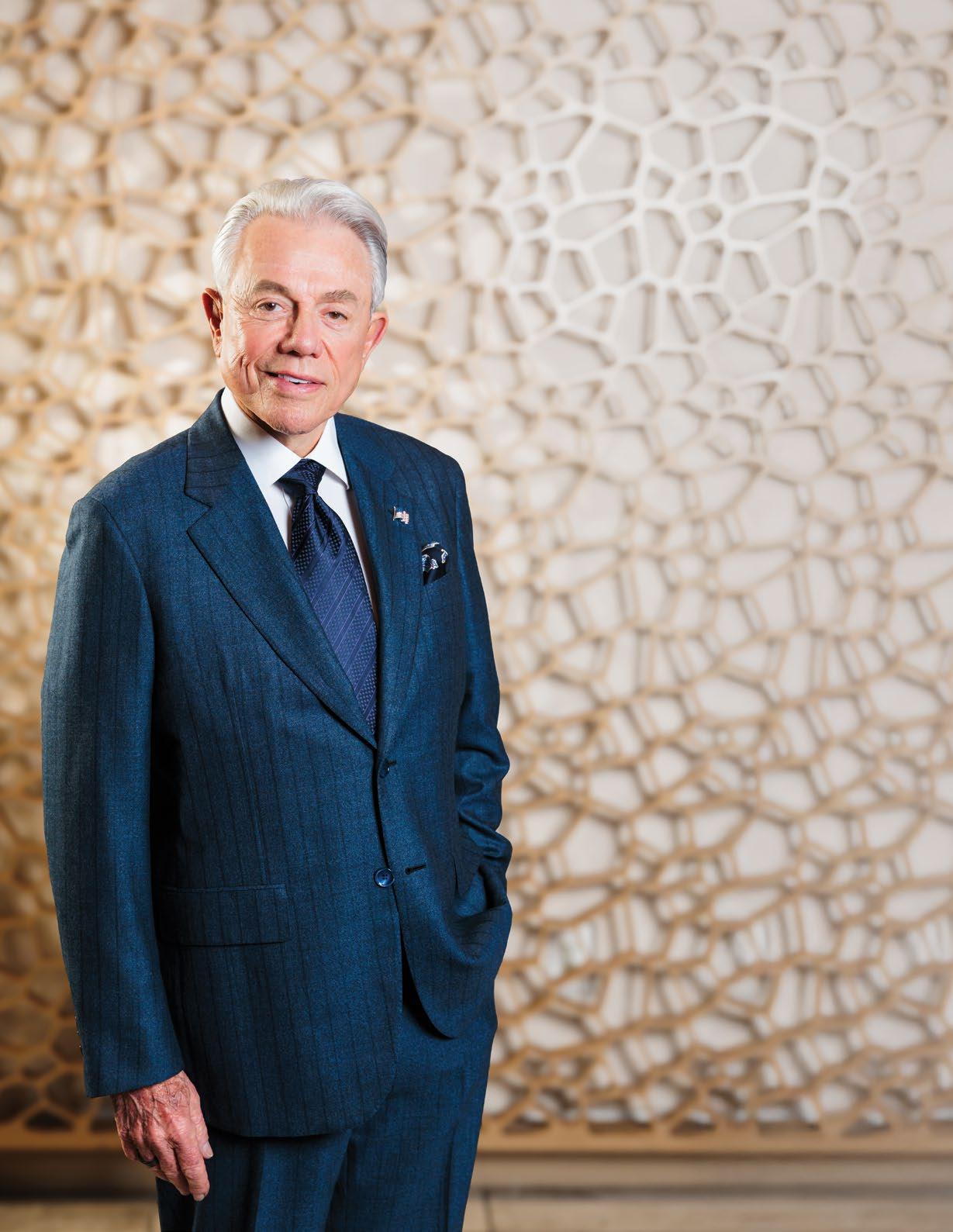
León The Legacy
A LIFELINE FOR COMMUNITY HEALTH CARE
PHILANTHROPY
For over six decades, the León family has been a cornerstone of health care and philanthropy in South Florida. Their journey began in 1964 with a modest clinic serving Cuban exiles. Today, his legacy encompasses a network of medical centers and transformative contributions to the Herbert Wertheim College of Medicine.
The Leon impact on FIU Medicine is profound. In 2008, Benjamin León, Jr., founder of Leon Medical Centers, was one of the early visionaries to invest in FIU’s nascent college of medicine, donating $10 million to establish the Benjamín León, Jr. Family Center for Geriatric Research and Education, one of the largest gifts from a Cuban American family to a U.S. university.
Long dedicated to serving those in need, particularly the aging community, the León family’s support of the Herbert Wertheim College of Medicine is helping advance innovative research and train compassionate physicians committed to building a healthier future for all.
The Benjamín León, Jr. Family Center for Geriatric Research and Education focuses on advancing translational epidemiology, geriatrics and gerontology, emphasizing active aging, frailty prevention and innovative health care delivery for older adults. It hosts the annual Leon Medical Centers Geriatrics Conference, connecting FIU faculty with geriatric physicians to address critical issues. Additionally, its seminar series on aging and health brings leading experts to campus, fostering dialogue and inspiring students.
The León gift also established the Leon Medical Centers Eminent Scholars Chair in Geriatrics. Through this endowed chair, FIU Medicine recently forged a groundbreaking partnership with the Miami VA Healthcare System to expand geriatric research and patient care, attracting top experts in the field.
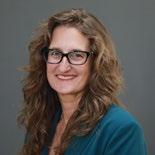
This collaboration created a joint leadership role integrating clinical expertise, research innovation and academic excellence. Jennifer Martin, Ph.D., was appointed as the Leon Medical Centers Professor in Geriatrics and director of the Benjamin Leon, Jr. Family Center for Geriatric Research and Education, as well as senior psychologist and director of the Geriatric Research, Education, and Clinical Center at the Miami VA. A licensed clinical psychologist with nearly two decades of experience in geriatrics and veteran-centered research, Martin previously served as associate director for clinical and health sciences research at the Greater Los Angeles VA and as a professor of medicine at UCLA’s David Geffen
School of Medicine. Her expertise spans geriatrics, behavioral sleep medicine and translational research.
“This unique role bridges two missions — delivering world-class care to veterans while advancing cutting-edge research and education in geriatrics through a prestigious academic partnership and endowed program,” said Dr. Juan C. Cendan, dean of FIU Medicine and senior vice president for health affairs at FIU.
Martin’s appointment is timely. Nearly half of U.S. veterans are 65 or older, and the number of those aged 85 and above is projected to rise significantly over the next decade. The demand for specialized geriatric care, long-term support and innovative approaches to healthy aging has never been greater.
Beyond the center, the León-FIU partnership provides FIU medical students with hands-on geriatric care experience at Leon Medical Centers across Miami-Dade County, which serve as teaching sites. Since the college’s founding, León has donated nearly half a million dollars in stethoscopes for incoming medical students — a practical gift that has equipped almost 2,000 students with an essential tool for their training.
León’s philanthropy extends beyond medicine. In 2024, he donated $10 million to FIU’s CasaCuba to support the construction of its new home, the Benjamín León Jr. Building, on FIU’s main campus. This Cuban American cultural and academic center will feature exhibition spaces, classrooms, and a forum for events. For León, who fled Cuba at 16, this project is deeply personal, preserving the exile experience for future generations.
Since arriving in South Florida, the León family has tirelessly addressed community needs. In 1964, León Sr., together with his son, founded Miami’s first pre-paid clinic to provide Spanishspeaking care for Cuban exiles — addressing a critical gap in the health system. Just six years later, the clinic received Florida’s first HMO license, positioning it as a pioneer in the nationwide HMO movement. In 1996, León Jr. built on that legacy establishing Leon Medical Centers, which now operates eight locations across MiamiDade County, serving the region’s growing aging population.
Through the years, León has supported causes such as La Liga Contra el Cáncer and contributed to leading research and medical centers, including Johns Hopkins University and Dana-Farber Cancer Institute. León has also invested in the future of health care by supporting Miami-Dade College’s Benjamin Leon Jr. School of Nursing. In 2025, President Donald Trump recognized his leadership in both philanthropy and entrepreneurship by nominating León as U.S. Ambassador to Spain and Andorra.

A FOUNDATIONAL GIFT
Carlos Duart and Tina Vidal-Duart donate $1M to Herbert Wertheim College of Medicine
In a heartfelt gesture rooted in personal legacy and a vision for transformative health care, Carlos Duart ’94, MS ’99 and Tina Vidal Duart ’02, MS ’04 have pledged a $1 million gift to the Herbert Wertheim College of Medicine.
This significant donation aims to bolster the college’s burgeoning partnership with Baptist Health, advancing medical research and addressing critical health care challenges in South Florida and beyond.
Chair of the FIU Board of Trustees, Duart is a proud FIU alumnus and CEO of CDR Enterprises. He attributes his deep connection to the university to his family’s history. Both of his parents, Cuban exiles, attended FIU,
with his father balancing a business and family while earning his degree and his mother ultimately becoming a public school teacher.
“FIU has changed our family trajectory for generations to come,” Duart says. “It has shaped this community and created a legacy of excellence.”
“FIU gave me opportunities I couldn’t find elsewhere,” VidalDuart adds, reflecting on her decision to attend FIU’s prestigious international business program over other scholarship offers.
The Duarts’ gift is not just a financial contribution but a catalyst for change, particularly through FIU’s partnership

with Baptist Health. Vidal-Duart, CEO of CDR Health Care, is excited about the partnership’s potential to tackle pressing health care issues, especially for Miami’s aging population and immigrant communities.
“We see FIU’s research capabilities as a way to address rare medical conditions and create a pipeline for students to solve these challenges,” she says.
Her leadership during the COVID-19 pandemic, overseeing Florida’s infectious disease field hospital system, underscores her commitment to innovative health care solutions.
The collaboration with Baptist Health aims to elevate FIU’s medical research to a national stage, with ambitions to establish a leading cancer institute and develop cuttingedge medical devices. Duart envisions FIU rivaling institutions like MD Anderson or Sloan Kettering, focusing on breakthroughs in Alzheimer’s and cancer research.
“This partnership can improve patient outcomes and create high-paying jobs by retaining graduates in South Florida,” he says. The economic ripple effect, he notes, will expand access to health care resources and position FIU as a global leader, particularly in Latin America.
Beyond the financial impact, the Duarts hope their gift will inspire philanthropy, especially within the Hispanic community.
“We want to lead by example and shift cultural perceptions about giving back,” Vidal-Duart says.
Their contribution is intended to accelerate FIU’s growth, enhance its research capabilities, and attract further support to transform health care through precision medicine.
Duart echoed this sentiment, emphasizing the importance of collaboration with Baptist Health to bring innovative concepts to life. “This is about building a legacy of impact,” he says.
The Duarts’ ties to FIU run deep. Duart is a member of FIU’s Entrepreneurship Hall of Fame and a recipient of the Outstanding Alumnus Medallion. Vidal-Duart received FIU’s Torch Award and has been involved with the FIU Honors College Advisory Board and the Chaplin School of Hospitality’s Vidal-Duart Wine Studies Program. They both have served on the FIU Foundation Board of Directors. Their shared commitment to their alma mater reflects a belief in its potential to drive change.
The Duarts’ donation stands as a testament to their vision for a healthier future. By investing in the Herbert Wertheim College of Medicine and its partnership with Baptist Health, they hope not only to honor their family’s legacy but also to pave the way for groundbreaking advancements in health care.
The couple’s gift is a call to action, urging others to join them in transforming lives through education and innovation.
Photo by Kira Derryberry
Grounded in Gratitude
Stauber family gift reduces financial, emotional barriers for medical students
When Aaron and Aviva Stauber watched their daughter Alyssa don her white coat at the Herbert Wertheim College of Medicine in 2014, they were nervous parents, braced for the grueling medical school experience. Instead, they found a school that nurtured Alyssa’s dream of becoming a doctor. It also sparked a commitment by the Staubers to the college that has transformed the lives of medical students through the Aviva & Aaron Stauber Scholarship Award and the Office of Student Affairs Activities Fund.
Since establishing the scholarship in 2019, the Staubers have supported 16 students. The award helps cover the cost of attendance, easing the financial and emotional strain many students face. Alyssa, now a practicing physician in New York after graduating from FIU Medicine in 2018, inspired her parents’ giving.
“We saw how much the school supported her,” says Aviva, who is a meeting planner at QOS Meetings. “But we also saw her classmates — many first-generation students, some far from home, carrying loans and heavy expectations.” The Staubers wanted to ensure others could thrive as Alyssa did.
Their generosity extends beyond scholarships. Recognizing the emotional toll of medical school, the Office of Student Affairs Activities Fund was created with an initial gift from the couple. The fund supports wellness programs, student breakfasts before exams, educational travel and community initiatives like the student-led Mammography Art Initiative, which promotes breast health services for women in South Florida.
“A coffee, a meal, a moment to connect — it matters,” Aviva says. “These students are under so much pressure. We want them to feel cared for.”
The Staubers’ involvement with FIU Medicine goes beyond financial contributions. They attend white coat ceremonies, setting up tables to reassure anxious parents.
“We share our story and let them know it’s going to be okay,” says Aaron, a real estate developer. They’ve offered their contact information to families, especially those not local, as a lifeline.
“Just knowing we’re there helps,” Aviva adds. They also participate in the scholarship selection process, reading essays from candidates.
“Their stories of resilience are incredible,” Aaron says. “These students are rock stars, overcoming family and financial challenges to pursue medicine.”
The couple is deeply invested in FIU Medicine’s role in South Florida’s growth. They applaud the school’s partnerships with Baptist Health and Nicklaus Children’s Hospital, which are expanding residency programs to keep graduates in the region and attracting top medical talent to the area.
“South Florida is growing fast,” Aaron says. “We need more doctors and hospitals, and FIU is making that happen.”
They’re especially proud of the college’s NeighborhoodHELP program, which sends students into the community to work with families.
“It’s not just about care — it’s about showing kids in those neighborhoods what’s possible,” Aviva says. “They see role models who look like them, are from their own streets.”
For the Staubers, giving to FIU Medicine is personal. At scholarship breakfasts, recipients often share how the support motivates them to pay it forward.
“They tell us it inspires them to give back one day,” Aviva says. “That’s what drives us.”
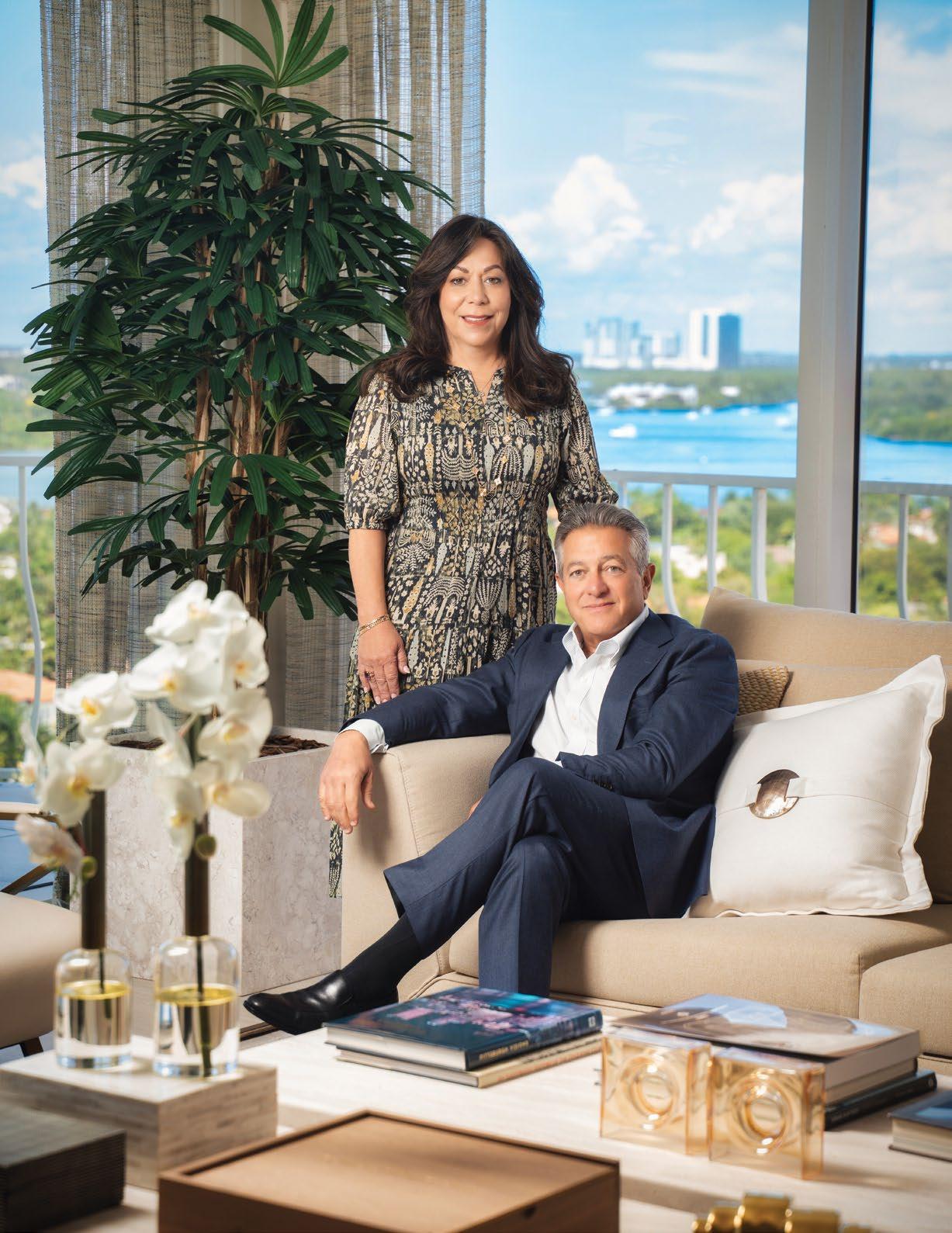
SKIN DEEP
Alumnus brings passion, precision to dermatology
Dr. Alexander Daoud ’16 bounds into his Winter Park dermatology clinic with the energy of a prizefighter. His scrubs are crisp, his smile wide and his enthusiasm for his craft — a blend of intricate surgery, diagnostic detective work and patient connection — is infectious.
Specializing in skin cancer and reconstructive surgery, Daoud has carved a niche in a field he describes as the “Venn diagram center” of medicine, surgery and pathology.
“Dermatology is everything,” he says. “You’re making diagnoses that connect to endocrine disorders, neuropsychiatric conditions, you name it. The surgeries are precise — everyone sees your work. And the pathology? In a single day, you can go from identifying skin cancers all the way to diagnosing autoimmune conditions and tropical diseases. It’s wild!”
Daoud spends two weeks each month at the Knight Dermatology Institute in Winter Park as their director of dermatologic surgery. He tackles complex skin cancer cases using Mohs surgery, a meticulous technique that achieves over 99% cure rates for some cancers while preserving healthy tissue.
The rest of the month, in addition to teaching at FIU, Daoud offers concierge cosmetics and general dermatology in Miami, with plans to open his own practice.
Much of Daoud’s career was shaped by FIU, where a full-tuition scholarship signaled the university’s belief in his potential.
“My dad told me, ‘When someone invites you to the dance, you dance your heart out,’” he recalls. His father, who passed away recently, was a cornerstone of his support system, alongside his mother, a radiologist whose authenticity at the bedside with breast cancer patients inspired Daoud’s own approach.
At FIU, he found a community that matched his enthusiasm — from classmates who became lifelong colleagues to advisors like Dr. Rebecca Toonkel, senior associate dean for academic affairs, who guided him through career pivots from orthopedics to dermatology.
“The school believed in me,” says Daoud, who was valedictorian of FIU Medicine’s Class of 2016. “I wanted to put FIU on the map.”
That drive propelled him to competitive fellowships at Johns Hopkins and Memorial Sloan Kettering, where he honed his skills alongside Ivy League peers.
Outside medicine, Daoud practices Muay Thai, a cerebral martial art, and draws from his Emory English Lit degree, sometimes trading Shakespeare with patients. He remains a lifelong student and approaches all aspects of his work with the heart his father urged him to give.

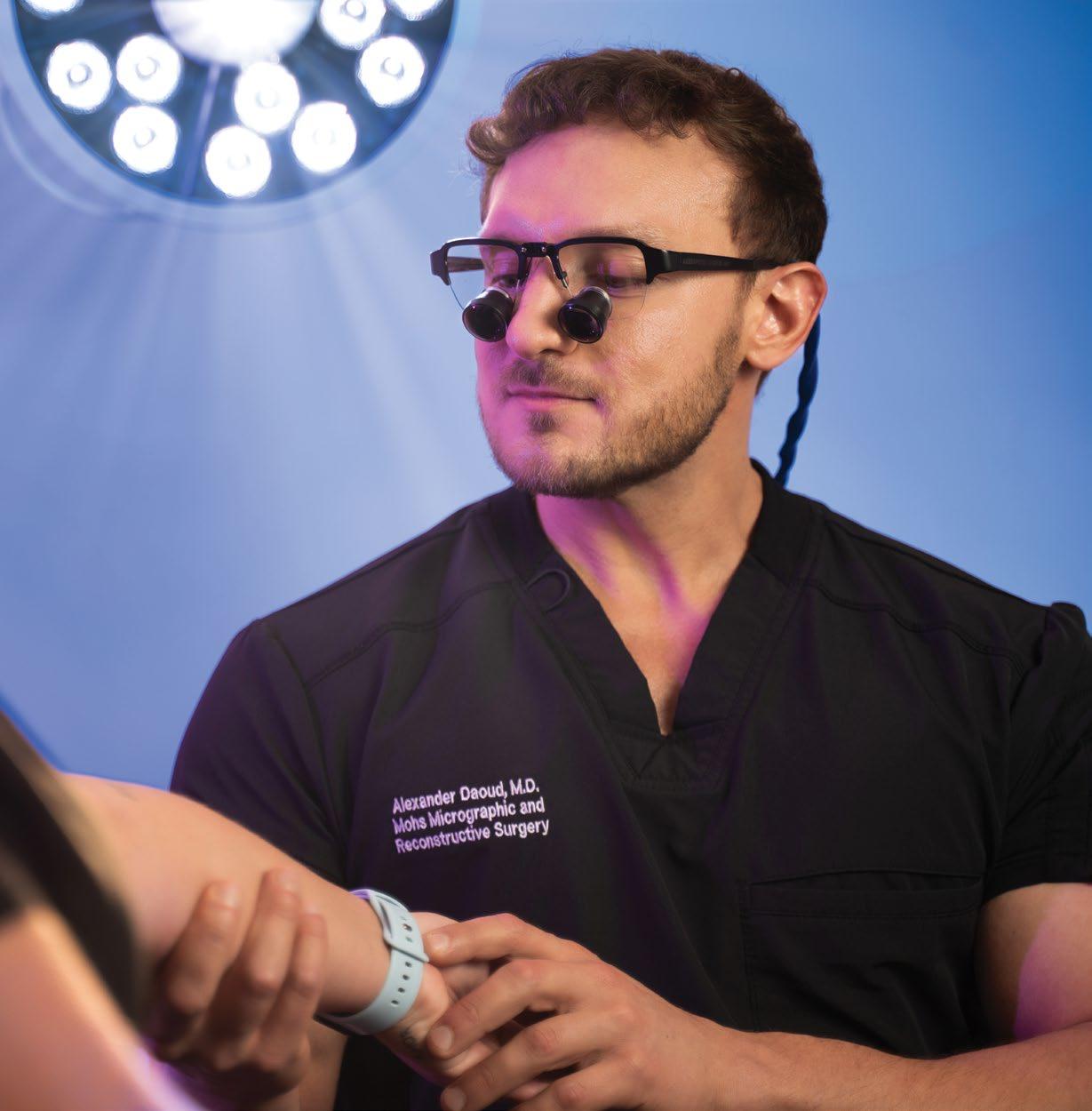
ALUMNI
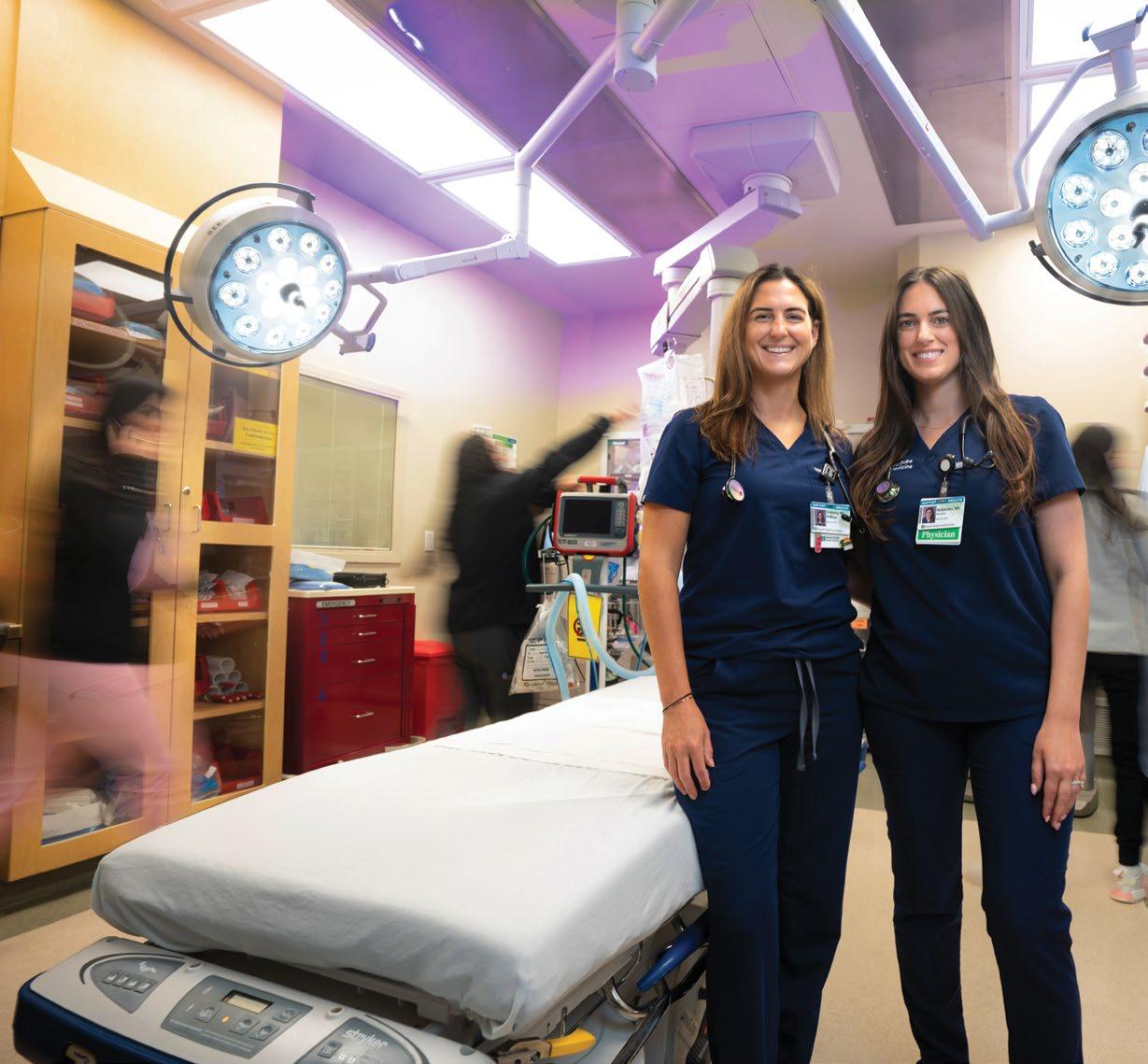
Dr. Kathryn Dasburg and Dr. Michelle Hernandez in the ER at Baptist Health Baptist Hospital.

FROM STUDY SESSIONS TO ER CONSULTS
A friendship forged in med school thrives at Baptist Health ALUMNI
In the emergency room, split-second decisions save lives. Here, in this high-stakes environment, Dr. Kathryn Dasburg ’18 and Dr. Michelle Hernandez ’18 thrive professionally and personally, with a versatile training and friendship that began during the grueling days of medical school and now flourishes at Baptist Health.
Dasburg and Hernandez first bonded during late-night study sessions at the Herbert Wertheim College of Medicine.
“We hit it off right away,” Hernandez recalls, chuckling about their pre-exam jitters. “We’d panic together, calculating what we needed to pass, and end up with nearly identical scores — sometimes just a point apart, even on our boards!” Dasburg agrees, “We were in sync — pulling all-nighters, acing tests, then celebrating with poolside chats. Work hard, play hard was our mantra.”
Their friendship grew through shared struggles — late nights over textbooks, mutual encouragement, and a love for adventure. Both in their early 30s, they connected over their dedication to medicine and zest for travel, hiking and relaxing in the Florida Keys. “We loved balancing intense work with cutting loose,” Dasburg says. “That’s why we clicked.” Their bond deepened through life’s milestones, from being in each other’s weddings to staying close during residencies — Dasburg at the University of Florida, Hernandez in Orlando.
Fate reunited them professionally at Baptist Health. After residency, Dasburg joined the ER in Miami. During a visit to see her family, Hernandez’s father landed in the hospital, sparking a chance encounter. “I mentioned Michelle was in town and asked my boss if we were hiring,” Dasburg recalls. “It was casual, but I knew she’d love it here.”
Hernandez, settled in Orlando, wasn’t job-hunting but couldn’t resist. “Katie said, ‘Want a job?’ I interviewed, fell in love with the role, and moved back to my hometown,” she says. “Working with my best friend — it’s been amazing.”
Now, the ER colleagues navigate their shifts with the same synergy they developed during their med school days. Overlapping weekly, they bounce ideas off each other and lean on each other. “Seeing your best friend at work is a gift,” Dasburg says. “We talk cases, get advice and know someone’s got our back.”
Their FIU training, especially under mentor Dr. Darren Roy Kaufman, a Baptist Health ER doctor and preceptor, instilled a methodical approach — starting with the ABCs (airway, breathing, circulation) — that anchors them in chaos.
“It made us confident we could handle anything,” Hernandez says.
For Hernandez, a Cuban-American, serving the community is deeply fulfilling. “I was born here. My family went to Baptist. Helping this community feels right,” she says.
Dasburg, tied to Miami through her parents, adds, “Patients are so grateful, especially in the Hispanic community. You’re not just treating one person — you’re guiding entire families.”
ALUMNI
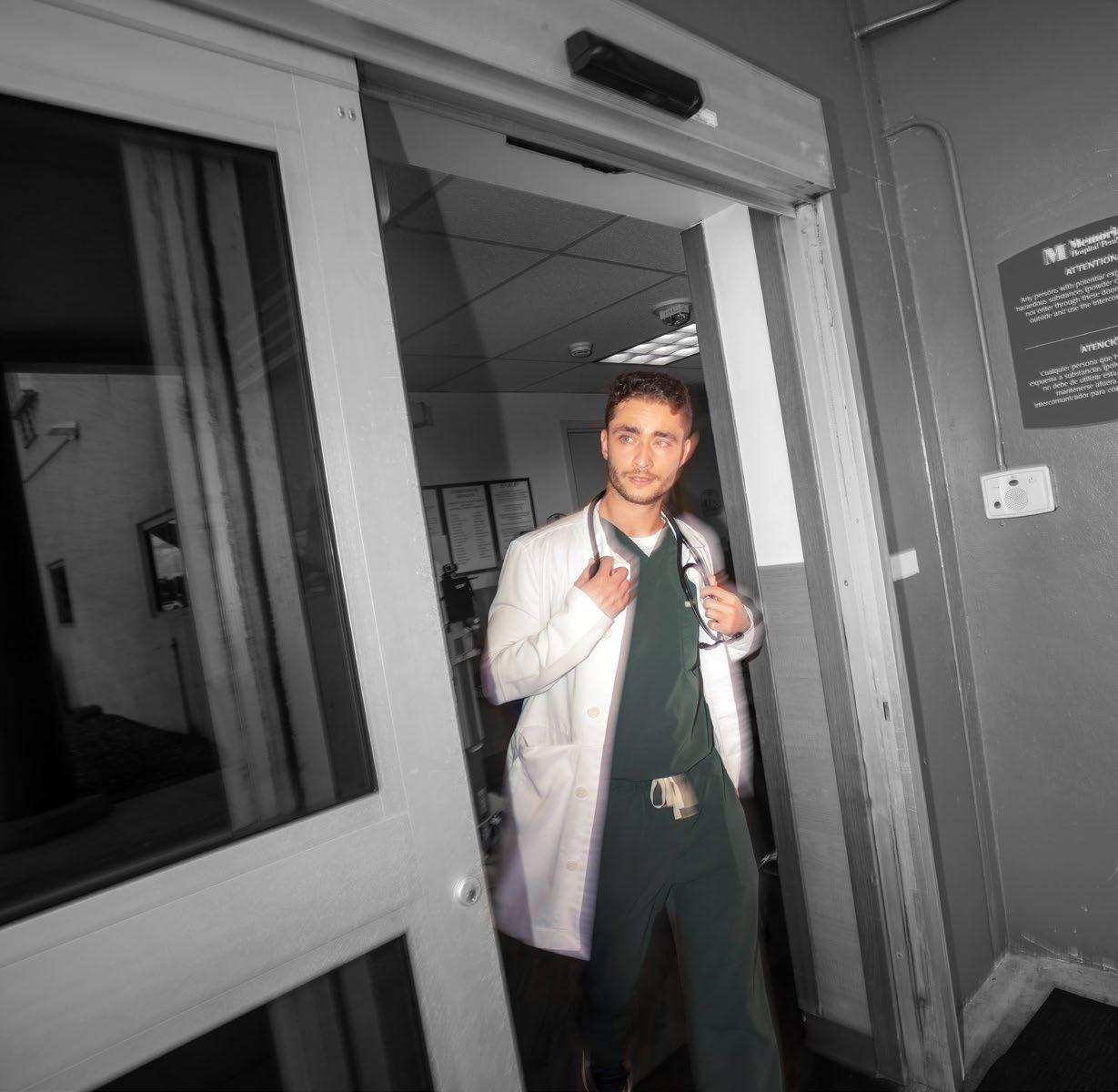

FLEXIBLE CARE
Alumnus balances meaningful medical career with freedom of not being on call
In the fluorescent-lit chaos of Memorial Hospital’s emergency room in Pembroke Pines, Valentin Frias Garcia ’19 moves with quiet precision. His hands, steady as they suture a laceration, belie the intensity of a shift where up to 30 cases demand his focus. For Frias Garcia, this high-stakes work is the culmination of a path shaped by FIU Medicine’s physician assistant program and his own unyielding commitment to medicine.
Born in Havana and raised in Pembroke Pines, Frias Garcia’s fascination with medicine took root in high school, during an AP biology class where anatomy captivated him. “I fell in love with the subject and chased it ever since,” he says.
Initially set on medical school, he shifted course late in his undergraduate years after discovering the physician assistant profession. Its blend of hands-on patient care and flexibility across specialties felt like a calling. FIU’s program, then in its third year, accepted his last-minute application, setting the stage for a transformative two years.
Professors like Dr. Felix Ley, a mentor whose meticulousness Frias Garcia still admires, instilled a deep respect for the craft. “They were so passionate, it made us care,” he says.
Frias Garcia’s first rotation was in the ER. “I knew that’s where I belonged,” he recalls. “Every patient’s a puzzle,” he explains. “You get clues, solve it fast and see them get better.”
One case lingers vividly. A young pregnant woman arrived with abdominal pain and high blood pressure. Frias Garcia’s quick diagnosis revealed preeclampsia and a breech delivery. With his attending and an obstetrician, he helped deliver a premature baby, saving both mother and child.
Such moments underscore why Frias Garcia loves the ER– and his passion and dedication are being recognized. He earned the Patient First Award at Memorial Hospital Pembroke for leading the complex premature delivery. His quick thinking also secured an Above and Beyond Award for reducing an 8-year-old girl’s wrist fracture and a Great Save recognition for diagnosing and stabilizing a man with an acute aortic dissection, ensuring life-saving surgery.
FIU’s lessons endure in Frias Garcia’s ability to multitask and communicate under pressure. He advises current students to lean on peers and embrace the grind: “It’s a lion’s den out there, but put patients first, and it falls into place.”
Off-duty, Frias Garcia balances the ER’s emotional weight with salsa classes, travel and time with family. He works 12 shifts a month, allowing him time for personal pursuits. By avoiding on-call duties, a lesson learned from past roles, he maintains a healthy balance between his demanding medical career and personal life.
ROOTED IN EXCELLENCE

Hippocratic Award honors mentorship, milestones
In a heartfelt celebration of mentorship and medical tradition, the Herbert Wertheim College of Medicine Class of 2025 bestowed the Hippocratic Award on Dr. Gagani Athauda, assistant dean for alumni teaching and advising, for her unwavering dedication to shaping future physicians.
Now in its second year, the award — rooted in the legacy of Hippocrates, the father of modern medicine — recognizes a faculty member who embodies professionalism, compassion and a commitment to healing.
Athauda’s name now joins Dr. Sarah Stumbar’s, last year’s inaugural recipient, on a plaque beside a wire sculpture of the Hippocratic Tree outside the Office of Student Affairs.
Athauda, who joined FIU in 2011, has guided countless students with her empathetic, rigorous approach. Her accolades include the college’s Excellence in Teaching Award (twice); the FIU Faculty Award for Excellence in Teaching; and multiple Advisor and Mentor of the Year honors.
“Growth, impact and gratitude guide my journey, and I hope they will yours,” she told rising third-year students at the ceremony, her words echoing the values of Hippocrates’ timeless oath.
The award, inspired by a sycamore tree under which Hippocrates reportedly taught 2,000 years ago, carries deep symbolism. A descendant of that tree thrives on the Greek island of Kos, and a cutting gifted from the University of Florida grows in FIU’s Grounds Nursery, poised to one day grace the medical school’s campus, if the South Florida climate allows.
“The tree’s deep roots symbolize the traditions of compassionate care and ethical conduct,” said Dean Juan Cendan, emphasizing the award’s significance.
The ceremony also marked a pivotal moment for the Class of 2027, as rising third-year students received pins etched with the sycamore tree, signifying their transition from classroom to clinical rotations.
“This pin reminds you of your sacred oath to prioritize patients’ welfare,” Cendan told them, highlighting the blend of professionalism and empathy central to FIU’s training.
Stumbar, associate dean for student affairs, reflected on her 2024 award, noting, “Medicine is a privilege because patients entrust you with their stories — Stories with a capital S.” As a primary care provider in FIU’s Green Family Foundation NeighborhoodHELP program, she models the holistic care she teaches, a standard Athauda upholds in her mentorship.
The event also celebrated standout students from the Class of 2027: Lauren Waidner (Outstanding Academic Performance), Audrey Petersen (Outstanding Community Service), Christelle Bucag (Outstanding Leadership), and David Harbaugh (Dan Castellanos Ph.D. Professionalism Award).
This new award and tradition reflect the college’s mission to cultivate not just skilled doctors but compassionate leaders. And as FIU’s sapling grows, so does its legacy.

“The Hippocratic tree’s deep roots symbolize the traditions of compassionate care and ethical conduct.”

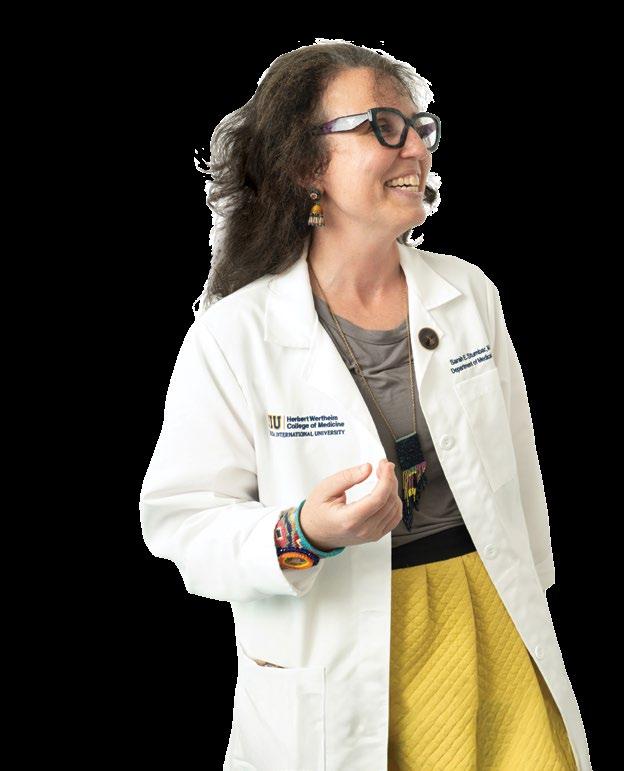
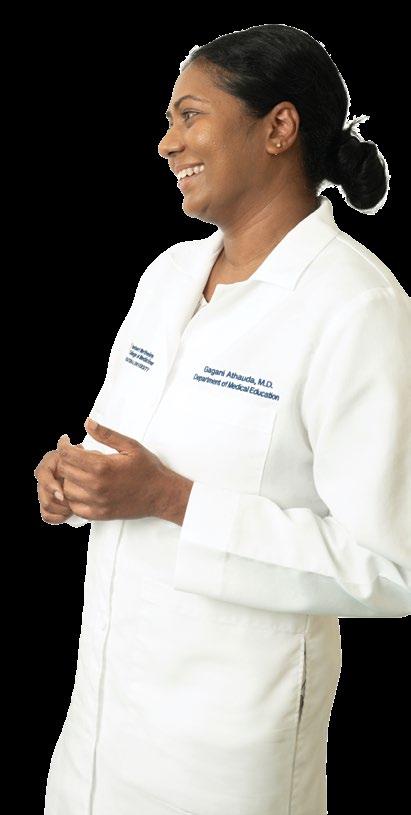
Dean Juan Cendan, on the significance of the Hippocratic Award.
Herbert Wertheim
PAVING PATHS TO SUCCESS
FIU Medicine’s Road to Residency career advising program recognized nationally
At FIU Medicine, the journey to residency is a marathon, not a sprint.
Amid the whirlwind of exams, clinical rotations and research, crafting a standout residency application can feel daunting. Enter the Road to Residency (R2R) program, a trailblazing initiative launched in 2022 that earned the 2024 AAMC Careers in Medicine Excellence Award for its innovative approach to career advising. Paired with the new Alumni Advising Program, FIU is redefining how medical students prepare for their futures, ensuring they shine as applicants and emerge as compassionate, skilled physicians.
The R2R program, hailed as the nation’s best in medical career advising, is a four-year roadmap guiding students from self-discovery to residency placement. “This is huge,” says Andres Rodriguez ’09, M.D. ’15, assistant
ACADEMIC SUPPORT
“It’s our hope that the diversity of our programming means that every student will be able to find happiness and fulfillment in their chosen specialty.”
— Dr. Sarah Stumbar, Associate Dean for Student Affairs.
dean of student life and development. “We’re passionate about ensuring no student is left behind, creating a model other schools can emulate.”
From day one, R2R provides a structure for career preparation, which can be overlooked amidst a demanding curriculum. As part of R2R, first- and second-year students engage in reflective assignments, CV writing, professionalism workshops, interest group programming and explore specialties through selfassessments that clarify their goals.
“The earlier we help students decide on their specialty, the better their roadmap to get there,” Rodriguez explains. “The journey to becoming a physician is challenging, and medical school is demanding. We actively engage key stakeholders and create meaningful opportunities for students to shape their own career paths.”
In their final year, students take a mandatory two-credit course, drafting personal statements and CVs, engaging in interview prep, and developing match strategies to help secure a successful match — incorporating guidance from faculty, staff, alumni advisors and deans. Students also get the opportunity to hear directly from program directors in various specialties via panels hosted over the summer before submitting their applications.
Roshni Bisoondial, a 2025 graduate currently in family medicine residency in New York, credits the course for easing her fears. “Your first draft is always terrible,” she laughs. “Getting it done early, with feedback from professors, got everything rolling.”
The program’s strength lies in its blend of town halls, one-on-one advising and mentorship from faculty and alumni.
“It’s our hope that the diversity of our programming means that every student will be able to take something away from R2R and will ultimately find happiness and fulfillment in their chosen specialty,” says Dr. Sarah Stumbar, associate dean for student affairs.
Students like Zachary Blashinsky, who matched in orthopedic surgery at Tripler Army Medical Center, praise R2R’s tailored support. “Orthopedic surgery is fiercely competitive,” he says. “My advisors, including Baptist Health surgeons, ensured I was on the right path.”
Bisoondial echoes this, noting the accessibility of advisors like Rodriguez and Stumbar. “They’re approachable, helping you see the big picture,” she says.
Complementing R2R, the Alumni Advising Program, launched in 2024, pairs students with recent graduates who offer relatable, real-world guidance. Dr. Gagani Athauda, assistant dean for alumni teaching and advising, leads the effort, ensuring alumni mentors like Stephanie Fernandez, M.D. ’18 and Blake Brown, M.D. ’20 are equipped to guide students. “Alumni have walked this path,” Athauda says. “They provide nuanced advice on transitioning to clinical practice and residency applications.”
Fernandez, an emergency medicine physician at Mount Sinai Medical Center in Miami Beach, finds mentoring first-year students thrilling. “They’re curious about specialties, and I’m excited to watch their interests evolve.”
Brown, an internist at Memorial Healthcare Systems, sees advising as a way to strengthen FIU from within. “It’s about supporting the next generation.”
Importantly, alumni mentors don’t grade students, creating a safe space to discuss challenges like mental health or finances. “Alumni advisors are like primary care providers, identifying concerns and connecting students to resources,” Rodriguez notes.
The R2R and Alumni Advising programs highlight FIU’s commitment to empowering students to thrive today and pay it forward tomorrow.
DELIVERING CONNECTIONS
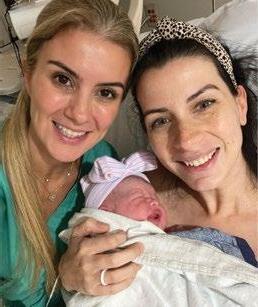
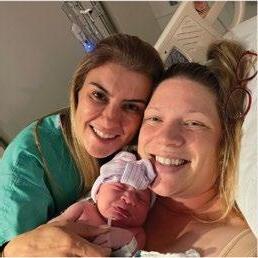
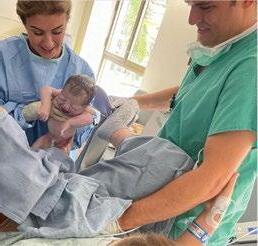
FIU’s alumni network empowers a Miami OB/GYN
Dr. Natalia Echeverri ’15 took a bold leap in 2011, entrusting her medical dreams to the Herbert Wertheim College of Medicine, which had just graduated its inaugural class in 2013. Rooted in Miami with her husband, she applied only to local schools, believing FIU’s innovative vision would shape her unique path.
Now, as chief of Obstetrics and Gynecology at South Miami Hospital, practicing with South Miami OBGYN Associates, Echeverri, 40, delivers more than babies — she fosters profound connections, serving the community that raised her and nurturing lifelong bonds with FIU alumni.
Echeverri’s journey is one of serendipity, resilience and the enduring support of her FIU network. Initially deterred by the demanding lifestyle of a doctor, she pursued a master’s in international administration. But a medical mission to Haiti after the 2010 earthquake reignited her passion.
“That trip solidified that my heart was in medicine,” she recalls. “I told my husband I’d give it one shot.”
FIU welcomed her, launching her medical journey.
At FIU, Echeverri found more than education — she found a family. Balancing motherhood — she had her first child as a second-year student and her second as a fourth-year — she leaned on her classmates.
“They carried me,” she says. “They tutored me at home while I was breastfeeding, stayed up late when I was struggling. I wouldn’t be a doctor without them.”
Professors like Dr. Emery M. Salom guided her toward OB/GYN, ensuring she thrived despite her demanding dual roles.
Echeverri’s choice of OB/GYN reflected her desire for a career that fit her life as a wife, mother and friend.
“I wanted to be present,” she says.
OB/GYN blended surgery, patient care and women’s empowerment, echoing her upbringing at Carrollton School of the Sacred Heart. Today, her practice thrives on FIU’s holistic approach. The school’s signature Green Family Foundation NeighborhoodHELP program taught her to see patients beyond diagnoses, addressing social and financial barriers.
“FIU showed us how to treat the whole person,” she notes.
Echeverri maintains deep ties with her medical school peers. In a lively group chat with five FIU classmates — now a general surgeon, ER physician, cardiologist, orthopedic surgeon, and herself, an OB/GYN — they share everything from birthday celebrations to professional consultations.
Adding to this connection, Echeverri has delivered the babies of three women in the group, including a memorable moment with Dr. Carolina Orbay ’15.
“She showed up at my office in labor, still planning to operate!” Echeverri laughs. Wheelchair in tow, she rushed Orbay to the hospital, where her husband, Dr. Fernando Aran ’15 — also a classmate — barely made it for their daughter’s birth.
In all, Echeverri has delivered about 10 babies of FIU Medicine alumni. These moments highlight the trust and camaraderie built at the college.
“Delivering my colleagues’ babies is humbling,” Echeverri says. “We studied together, pulled allnighters, and now I’m part of their milestones.”
For Echeverri, FIU’s alumni network isn’t just professional — it’s a heartfelt lifeline shaping her career and community.
Drs. Carolina Orbay & Fernando Aran and baby Maria del Mar
Dr. Monica Polcz & baby Georgina
Dr. Rebecca Gaffley & baby Grace
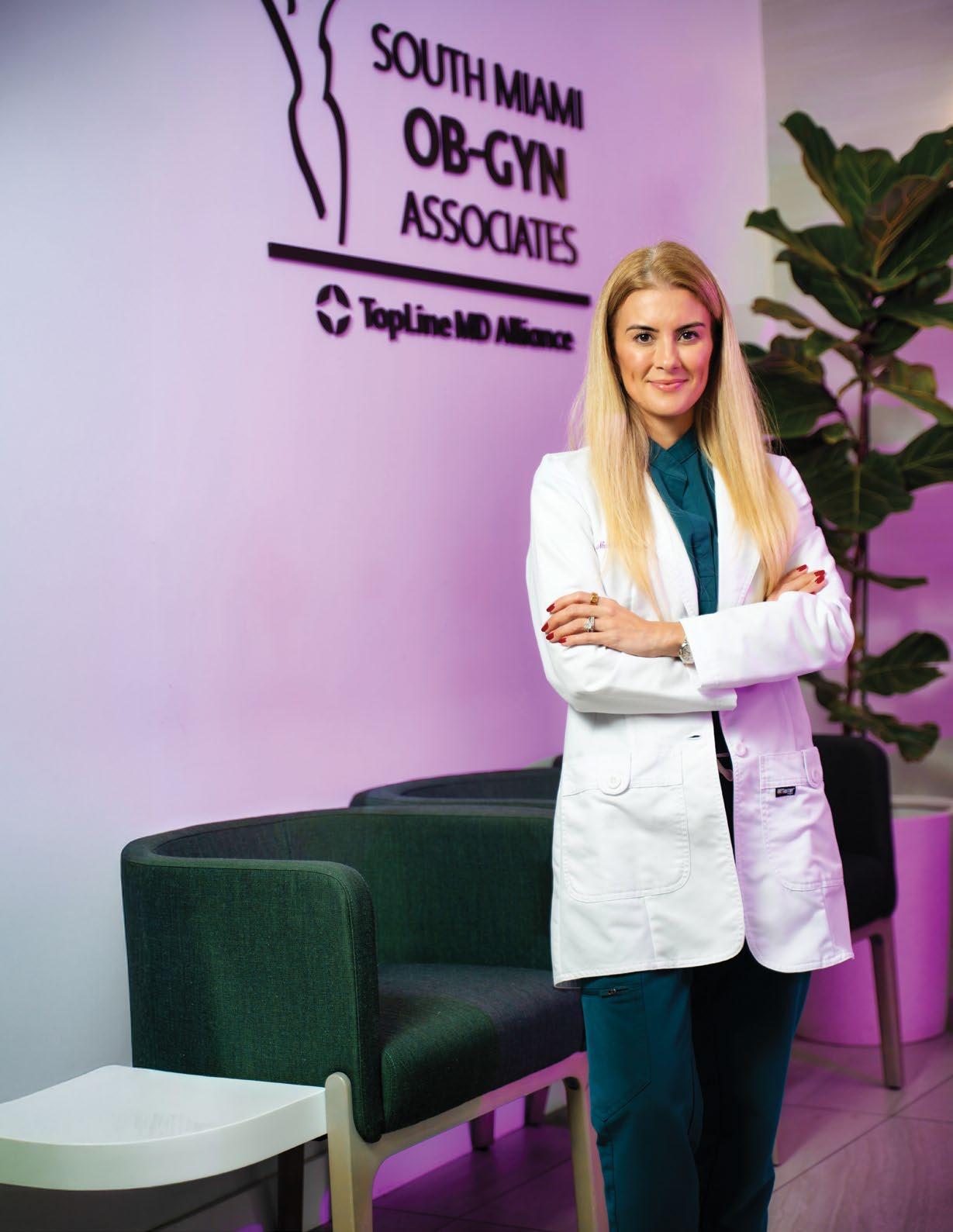

“Delivering my colleagues’ babies is humbling. We studied together, pulled allnighters, and now I’m part of their milestones.”
Dr. Natalia Echeverri
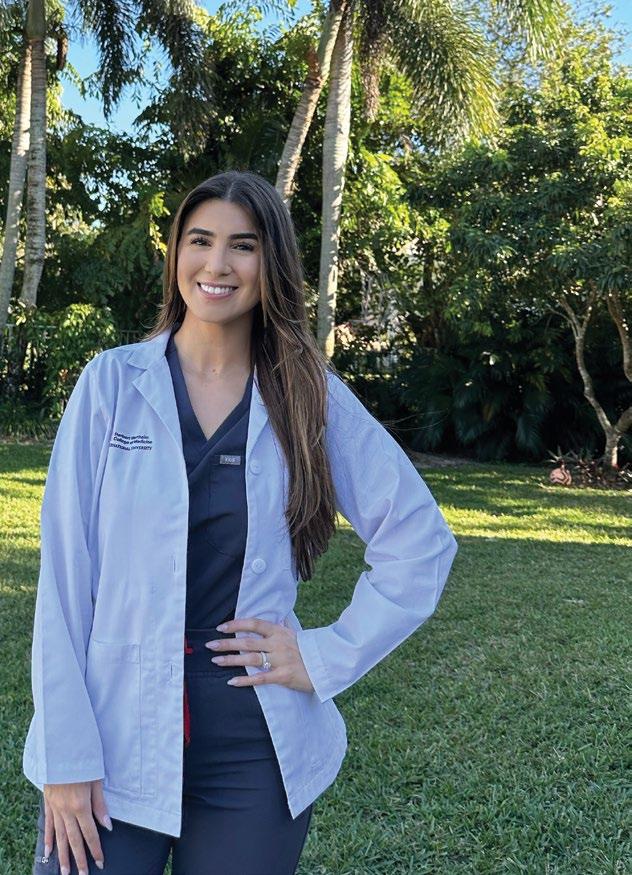

SCAN THE QR CODE FOR THE FULL ARTICLE
THE MOMENTS THAT GO UNNOTICED
MELANIE MOLINA, M.D.
’25
In this first-person piece, recent grad Melanie Molina, M.D. ’25, recalls a poignant story from her OB-GYN rotation, caring for a patient delivering a stillborn baby, turning a typical day into a memorable, melancholy experience. Molina’s narrative first appeared in In-Training; it has been edited and abridged for FIU Medicine.
When you begin clinical rotations in medical school, people encourage you to be as involved as possible in patient care. They tell you to take initiative, to challenge yourself. They also tell you that there will be times when it is most appropriate to stand back and observe. It is in some of these moments that the most valuable lessons are learned.
You are in your second rotation — obstetrics and gynecology. You walk into the residents’ room as you do every morning before meeting with the attendings. The nurse calls about a patient who came in overnight with bleeding, indicating intrauterine fetal demise. You enter the room with the attending and resident, feeling the palpable sadness as a young woman your age faces her worst day.
You observe the tiny, perfect baby being delivered breech, counting its fingers and toes. The attending explains she isn’t dilated enough. You notice her teary-eyed partner holding her hand and wonder about her second-trimester plans.
The resident checks on you, mouthing, “You okay?” and later asks about phrasing explanations in Spanish for the patient.
After administering medication, the team steps out, leaving a white wreath on the door. Back inside, silence prevails as the resident explains a placental abruption, reassuring the patient it wasn’t her fault. You both cry, retreating to the residents’ room. Months later, seeing the resident and intern again stirs memories of that unnoticed, impactful day.
HEALING’S FIRST BREATH
EMILIO BLAIR
In this first-person piece, fourth-year medical student Emilio Blair shares a poignant story from his family medicine rotation, caring for a patient grieving her sister’s death, turning a routine checkup into a memorable, emotional experience. The narrative has been edited and abridged for FIU Medicine
The clinic room was quiet, the air laced with the familiar scent of hand sanitizer. Cold air crept out from the overhead vent and slipped through my scrubs, sharpening my focus but numbing my hands at the same time. I was a third-year medical student on my family medicine rotation. Sitting across from me was my first patient of the day, a woman in her 40s, here for her routine annual checkup.
I settled onto a stool, just below her eye level, and asked, “What brings you in today?” She appeared composed as she began, noting no pressing health concerns. Her voice was steady and measured, yet soft. Nothing was immediately concerning, yet her reserved demeanor hinted at something more. I continued the interview, piecing together her story: a single mother, working long hours, having left South America months earlier, struggling to adjust.
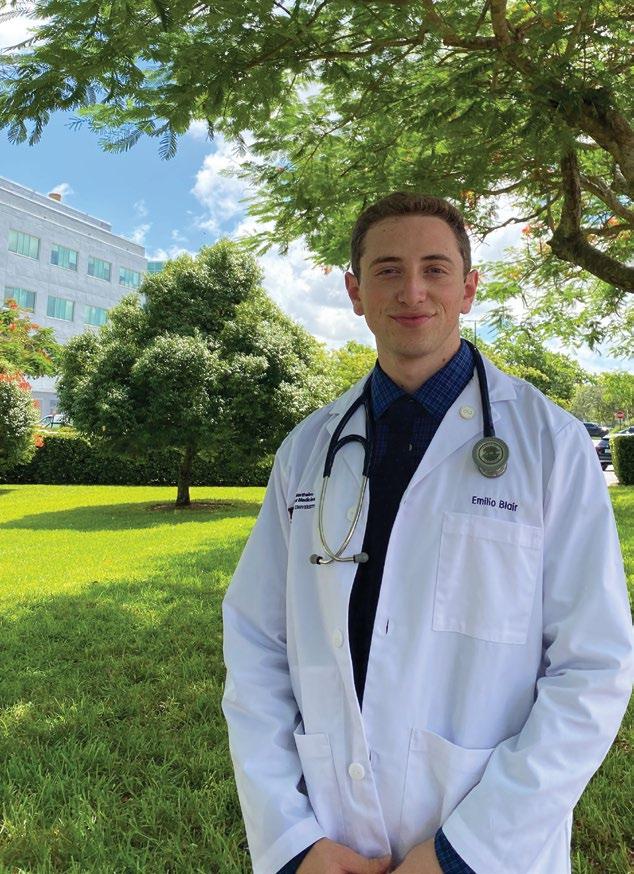
I recalled my own move from Mexico to the United States as an 8-yearold, seeing it reflected in her words. We exchanged small details about our experiences. I asked about her exercise habits. She replied, “Because of recent family events, I haven’t been able to exercise as much.” Her tone shift prompted me to ask, “If it’s not too difficult, could you tell me a little about that?” She paused, then shared her sister’s sudden death from cancer, her anguish, and barriers keeping her from being there.
Tears fell as she spoke of grief thousands of miles from home. I validated her struggle, opening a space for her to consider counseling. This routine visit transformed into a profound connection, teaching me the power of listening.

SCAN THE QR CODE FOR THE FULL ARTICLE
CLASS NOTES
CLASS OF 2013
Hanadys Ale, M.D.
Immunologist and allergist at Joe DiMaggio Children’s Hospital/Memorial Healthcare System and medical director of its 22q Multidisciplinary Program, specializing in the care of children and adults with 22q11.2 Deletion Syndrome. Serves as Immunology Course Director for Foundations II: Principles of Microbiology, Immunology, Pathology, and Pharmacology at FIU Medicine.
CLASS OF 2015
Andres Rodriguez, M.D.
Assistant dean for student services at FIU Medicine. Completed his family medicine residency at Baptist Health West Kendall Baptist Hospital.
CLASS OF 2017
Alexander Braley, M.D.
Joined West Virginia University Rockefeller Neuroscience Institute as a fellowship-trained neurosurgeon, specializing in stereotactic and functional neurosurgery with an interest in minimally invasive spine surgery. Completed neurological surgery residency at SUNY Upstate Medical University in Syracuse, New York, and a fellowship in functional neurosurgery at WVU.
CLASS OF 2018
Luis Felipe Tornes, M.D.
Appointed associate program director of the FIU/Baptist Health Neurology Residency and director of the Epilepsy Program at Baptist Health Miami Neuroscience Institute. Completed neurology residency and a clinical neurophysiology fellowship at the University of Miami Miller School of Medicine/Jackson Memorial Hospital System.
Jennifer Thompson, M.D.
Adolescent medicine specialist and education director within the Division of Adolescent Medicine at Nicklaus Children’s Hospital. Recently completed her goal of visiting all 63 U.S. national parks and all 50 states.
CLASS OF 2019
Javier Nahmias, M.D.
Joined Eye Surgery Associates in Pembroke Pines, Florida, after completing ophthalmology residency at Wake Forest Baptist Hospital and a glaucoma fellowship at the Bascom Palmer Eye Institute in Palm Beach Gardens, Florida.
CLASS OF 2020
Haley McKissack, M.D.
Graduated from Emory University Orthopedic Surgery Residency and is completing a sports medicine fellowship at University of Colorado Boulder.
CLASS OF 2022
Ana Sosa-Sanchez, M.D.
Joined Baptist Health Primary Care as a family medicine physician. Completed her family medicine residency at Baptist Health West Kendall Baptist Hospital in Miami, where she served as wellness chief.
Jorge Fleites, M.D.
Hospitalist at Baptist Health South Miami Hospital. Completed his internal medicine residency at University of Miami/Jackson Health System.
CLASS OF 2023
Nicholas Conway, M.D.
Elected ACOG District III Junior Fellow Chair, sits on the national Junior Fellow College Advisory Council (JFCAC), and chairs the JFCAC workgroup on Green Journal engagement and Junior Fellow contests. Serves as a peer reviewer for the Green Journal and was a 2023 and 2024 Golden Apple Resident Teaching Award finalist. Currently a PGY-3 at Cooperman Barnabas Medical Center/Rutgers Health OBGYN Residency program, applying for reproductive endocrinology and infertility this coming year.
IN MEMORIAM
Schuyler Hodge, M.D. ’19
1990–2025
Obstetrician and gynecologist in New Jersey. Passed away June 14, 2025.


The end of one journey and the beginning of another — members of the M.D. Class of 2025 celebrate graduation day with a joyful toss of their caps.
Herbert Wertheim College of Medicine
Florida International University
11200 SW 8th St. AHC2 Miami, FL 33199

